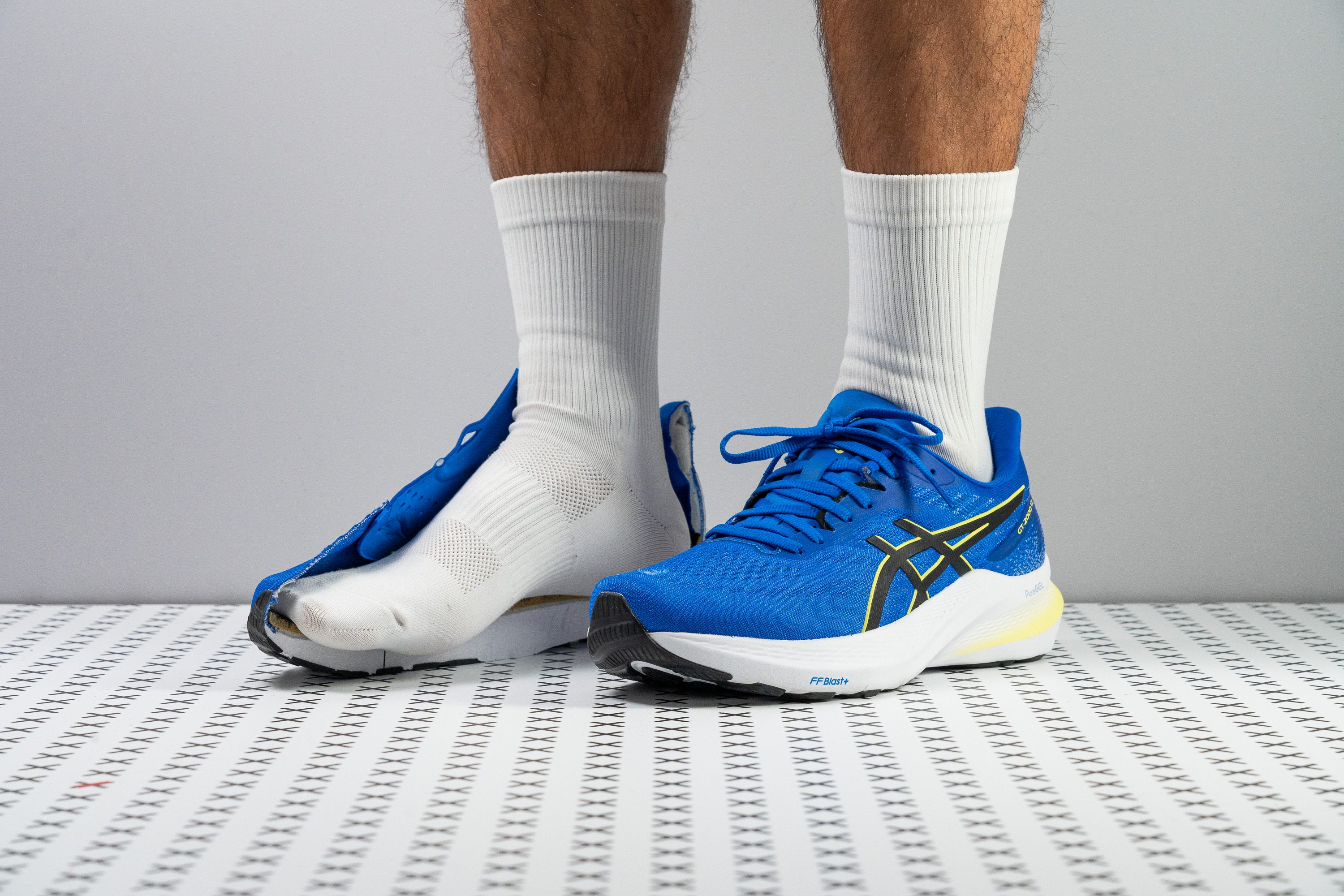Our verdict
- Top pick in best running shoes for plantar fasciitis (2024)
- Top pick in best ASICS walking shoes (2024)
Pros
- Stable yet non-intrusive
- Built for endurance on long runs
- Lightest model in its series
- Top-notch comfort
- FF Blast+ cushioning for the first time in a GT 2000
- PureGel technology for heel strikers
- Remarkable durability of the outsole
- Great value at $140
Cons
- Breathability could be improved
- Might require a brief break-in period
- FF Blast+ lacks energy return
- Inconsistent traction
Audience verdict
- Top 15% in road running shoes
- Top 22% in ASICS running shoes
- Top 30% most popular running shoes
Comparison
The most similar running shoes compared
+ + Add a shoe | |||||
|---|---|---|---|---|---|
| Audience score | 90 Superb! | 85 Good! | 82 Good! | 80 Good! | |
| Price | $140 | $140 | $140 | $125 | |
| Pace | Daily running | Daily running | Daily running | Daily running | |
| Shock absorption | Moderate | Moderate | High | High | |
| Energy return | Low | Moderate | Moderate | Moderate | |
| Traction | Moderate | High | High | High | |
| Arch support | Stability | Stability | Stability | Stability | |
| Weight lab Weight brand | 9.7 oz / 275g 9.4 oz / 266g | 10.4 oz / 295g 10.5 oz / 298g | 9.5 oz / 269g 9.4 oz / 266g | 8.1 oz / 231g 8 oz / 228g | |
| Lightweight | ✗ | ✗ | ✗ | ✓ | |
| Drop lab Drop brand | 10.0 mm 8.0 mm | 9.3 mm 8.0 mm | 8.7 mm 8.0 mm | 9.4 mm 5.0 mm | |
| Strike pattern | HeelMid/forefoot | HeelMid/forefoot | HeelMid/forefoot | HeelMid/forefoot | |
| Size | True to size | Slightly small | True to size | Slightly small | |
| Midsole softness | Balanced | Soft | Soft | Soft | |
| Difference in midsole softness in cold | Small | Big | Normal | Big | |
| Toebox durability | Decent | Decent | Decent | Bad | |
| Heel padding durability | Good | Bad | Good | Decent | |
| Outsole durability | Good | Decent | Good | Bad | |
| Breathability | Moderate | Moderate | Warm | Breathable | |
| Width / fit | Medium | Medium | Medium | Narrow | |
| Toebox width | Medium | Medium | Narrow | Narrow | |
| Stiffness | Moderate | Moderate | Moderate | Moderate | |
| Torsional rigidity | Stiff | Moderate | Stiff | Stiff | |
| Heel counter stiffness | Stiff | Stiff | Stiff | Stiff | |
| Rocker | ✗ | ✗ | ✗ | ✓ | |
| Heel lab Heel brand | 36.6 mm 34.5 mm | 36.8 mm 38.0 mm | 36.9 mm 36.5 mm | 36.0 mm 33.0 mm | |
| Forefoot lab Forefoot brand | 26.6 mm 26.5 mm | 27.5 mm 30.0 mm | 28.2 mm 28.5 mm | 26.6 mm 28.0 mm | |
| Widths available | NarrowNormalWideX-Wide | NarrowNormalWideX-Wide | NormalWideX-Wide | NormalWide | |
| Orthotic friendly | ✓ | ✓ | ✓ | ✓ | |
| Season | All seasons | All seasons | All seasons | SummerAll seasons | |
| Removable insole | ✓ | ✓ | ✓ | ✓ | |
| Ranking | #84 Top 13% | #221 Bottom 42% | #281 Bottom 26% | #318 Bottom 16% | |
| Popularity | #203 Top 30% | #40 Top 11% | #69 Top 19% | #56 Top 15% |
Who should buy
We think the ASICS GT 2000 12 is an excellent pick for:
- Runners looking for a reliable daily trainer with a touch of stability support, particularly appealing to women who generally pronate a bit more than men.
- Those seeking a versatile, not overly stacked shoe that does a great job in short and long runs, and delivers consistent performance.
- Anyone in need of a comfortable, supportive shoe that offers a well-rounded experience at a great value.
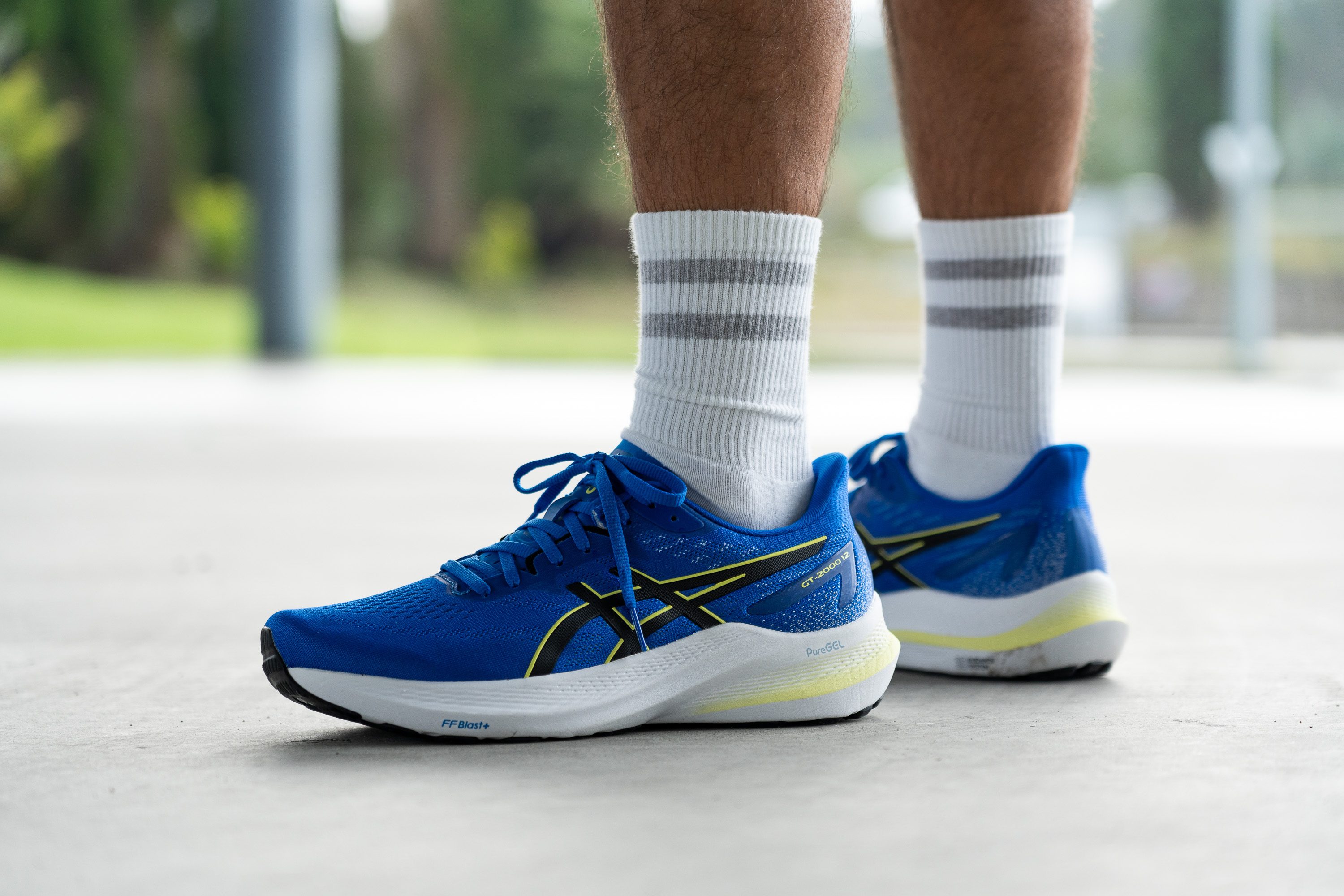
Who should NOT buy
If you're on the hunt for the ultimate performance daily trainer, the GT 2000 12 might fall slightly short, which is understandable at its $140 price point. For those seeking that additional performance boost, we believe the ASICS Superblast is a superior choice, delivering enhanced energy return in a lighter yet still stable package.
Also, we think the GT 2000 12 might not be the ideal pick for running on the hottest summer days due to its somewhat limited ventilation. However, the market offers some excellent stability daily trainers with superior airflow, and we suggest the Brooks Glycerin GTS 20 or the Saucony Tempus.
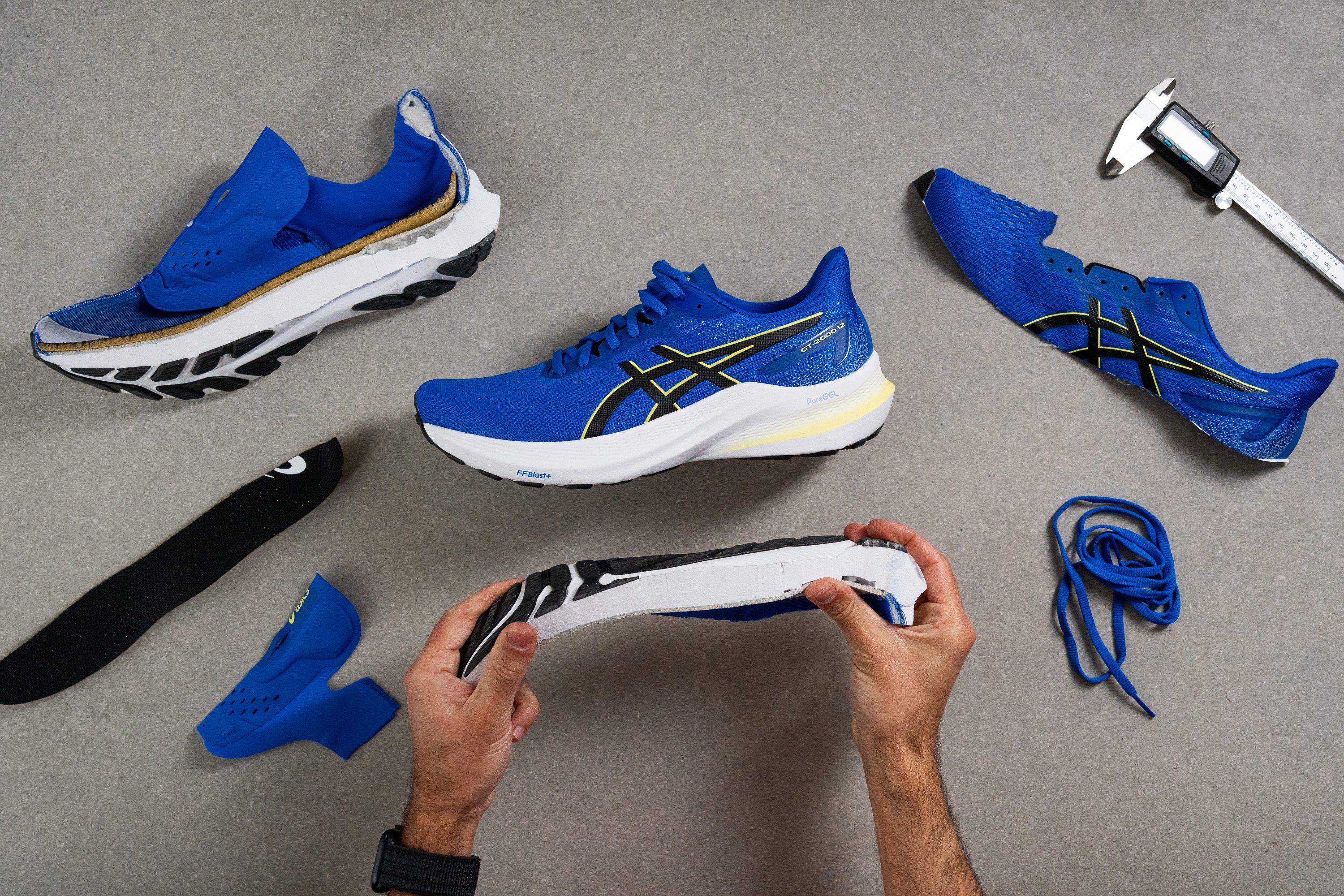
Cushioning
Shock absorption
The addition of FF Blast+ marks the first time this foam appears in the GT 2000 series, bringing enhanced shock absorption thanks to its EVA and Olefin blend instead of standard EVA. However, it remains a moderately cushioned shoe, with our ASTM F1976 showing 119 SA in the heel and 108 SA in the forefoot.
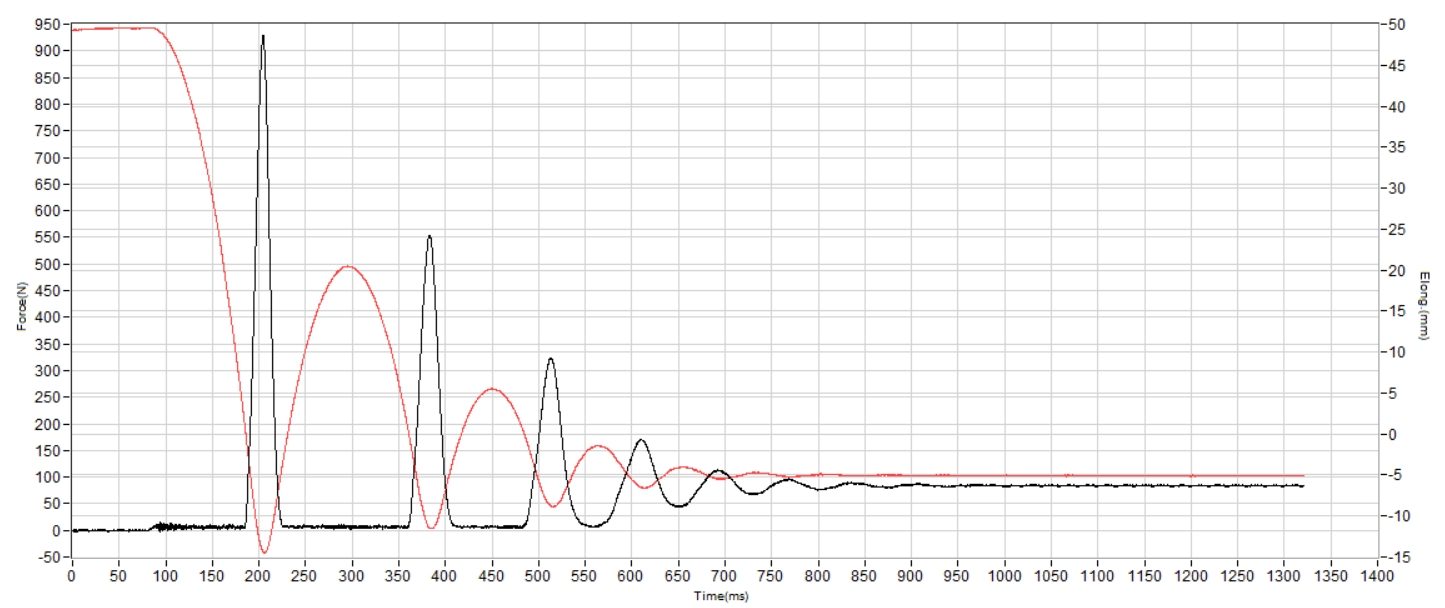
| GT 2000 12 | 119 SA |
| Average | 130 SA |
Energy return
Despite the updated foam, energy return is still underwhelming in this shoe. With just 47.9% bounce in the heel, it falls short of expectations—especially for a model in this price range.
| GT 2000 12 | 47.9% |
| Average | 58.6% |
Heel stack
The GT 200 12 has a total heel stack of 36.6 mm, a feature that will delight heel strikers—the majority of users for this shoe.
By the way, take a closer look at where we placed our calipers. There, you'll spot another innovation of the GT 2000 12—PureGEL. Borrowed directly from top-tier ASICS shoes like the Nimbus 25, it offers a plushier feel for heel strikers, elevating their running experience.
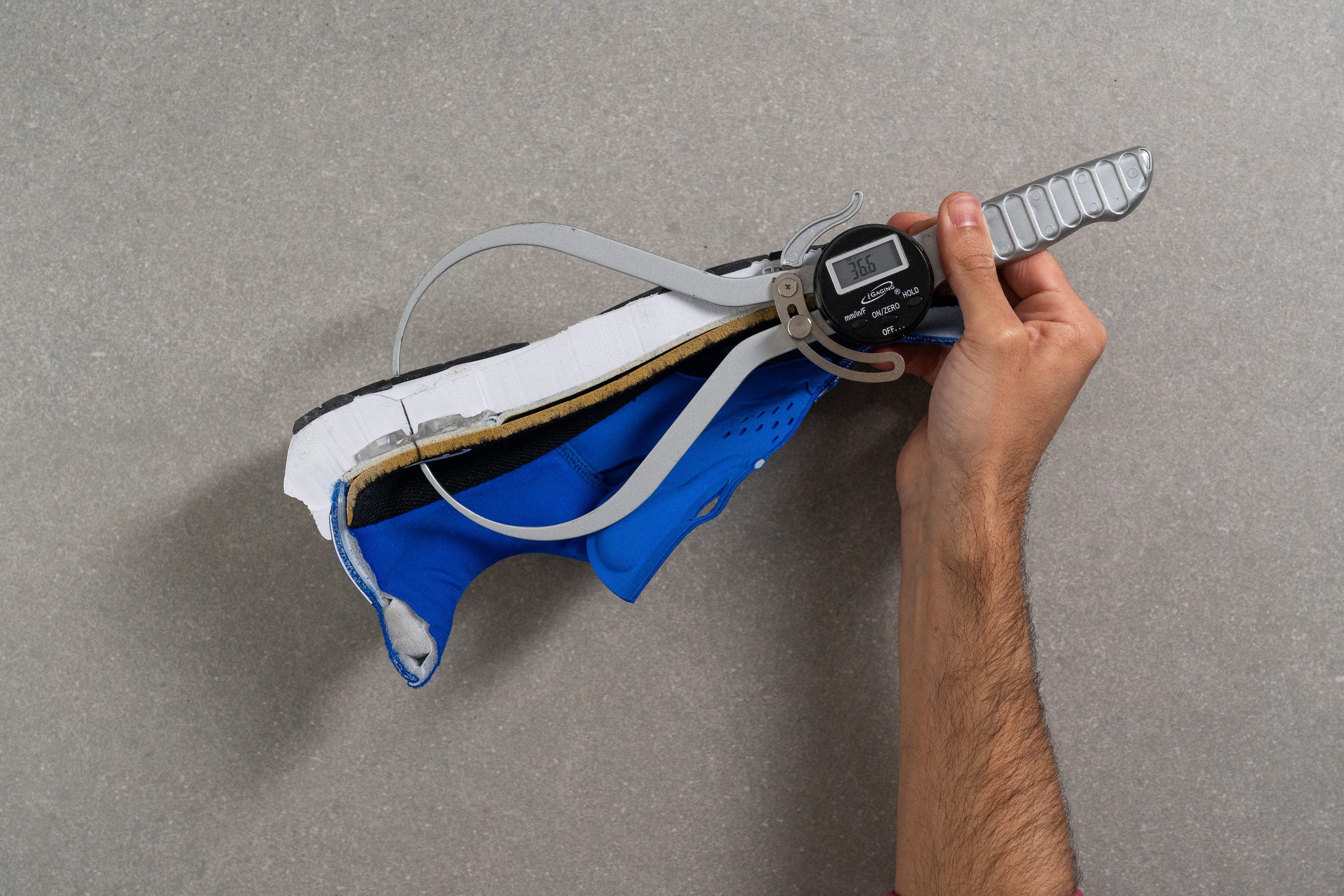
| GT 2000 12 | 36.6 mm |
| Average | 34.8 mm |
Forefoot stack
In the forefoot, we measured 26.6 mm, offering a good amount of cushion for midfoot and forefoot strikers who want a reliable stability shoe. However, heavier runners might want to consider the maximalist Kayano 30 for a slightly thicker forefoot.
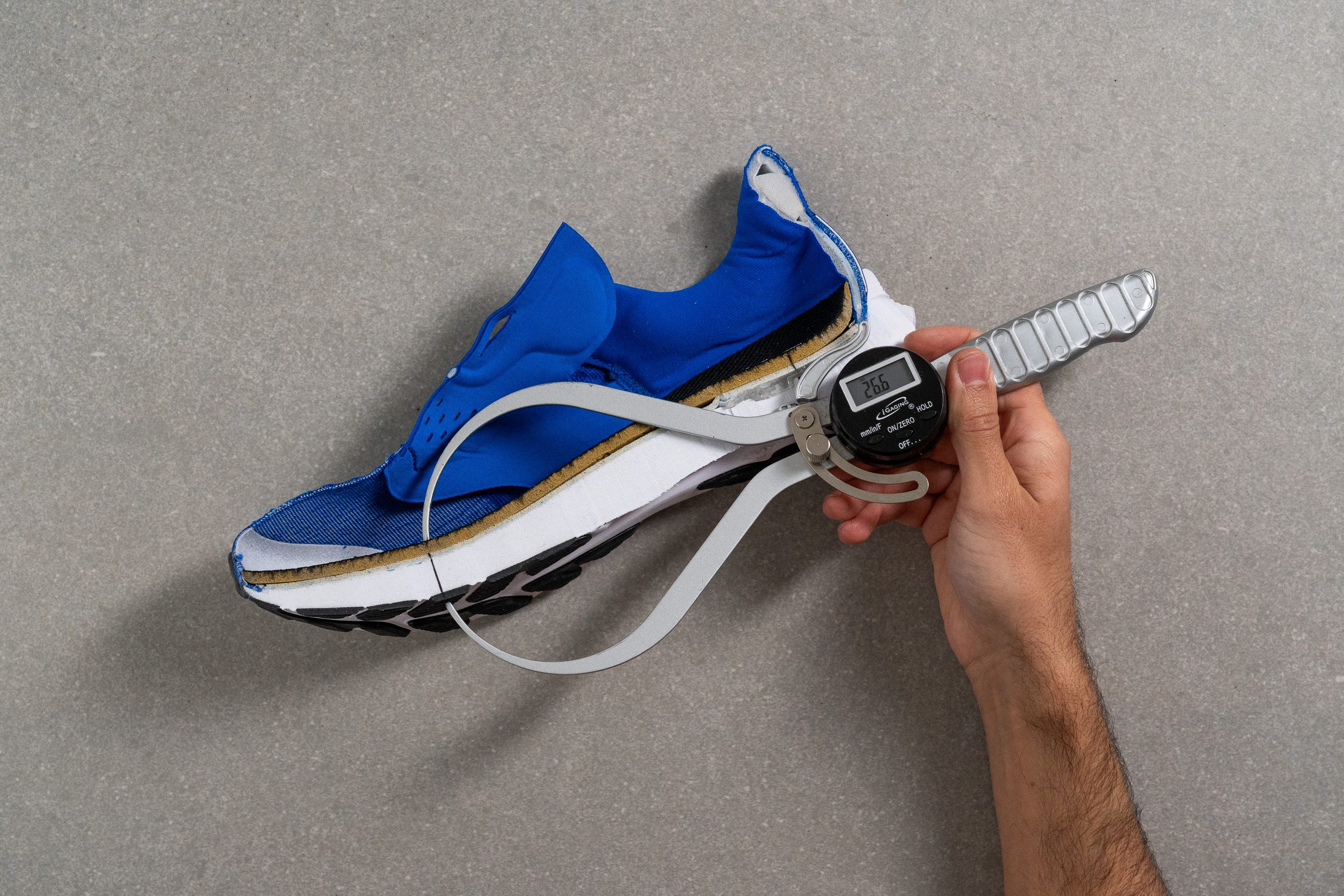
| GT 2000 12 | 26.6 mm |
| Average | 26.2 mm |
Drop
The difference between the two measurements results in a 10.0-mm heel-to-toe drop. This is typical for a daily trainer and works well for most runners. However, if you're looking for a stability shoe with a lower drop, the Hoka Arahi 6 might be a better choice.
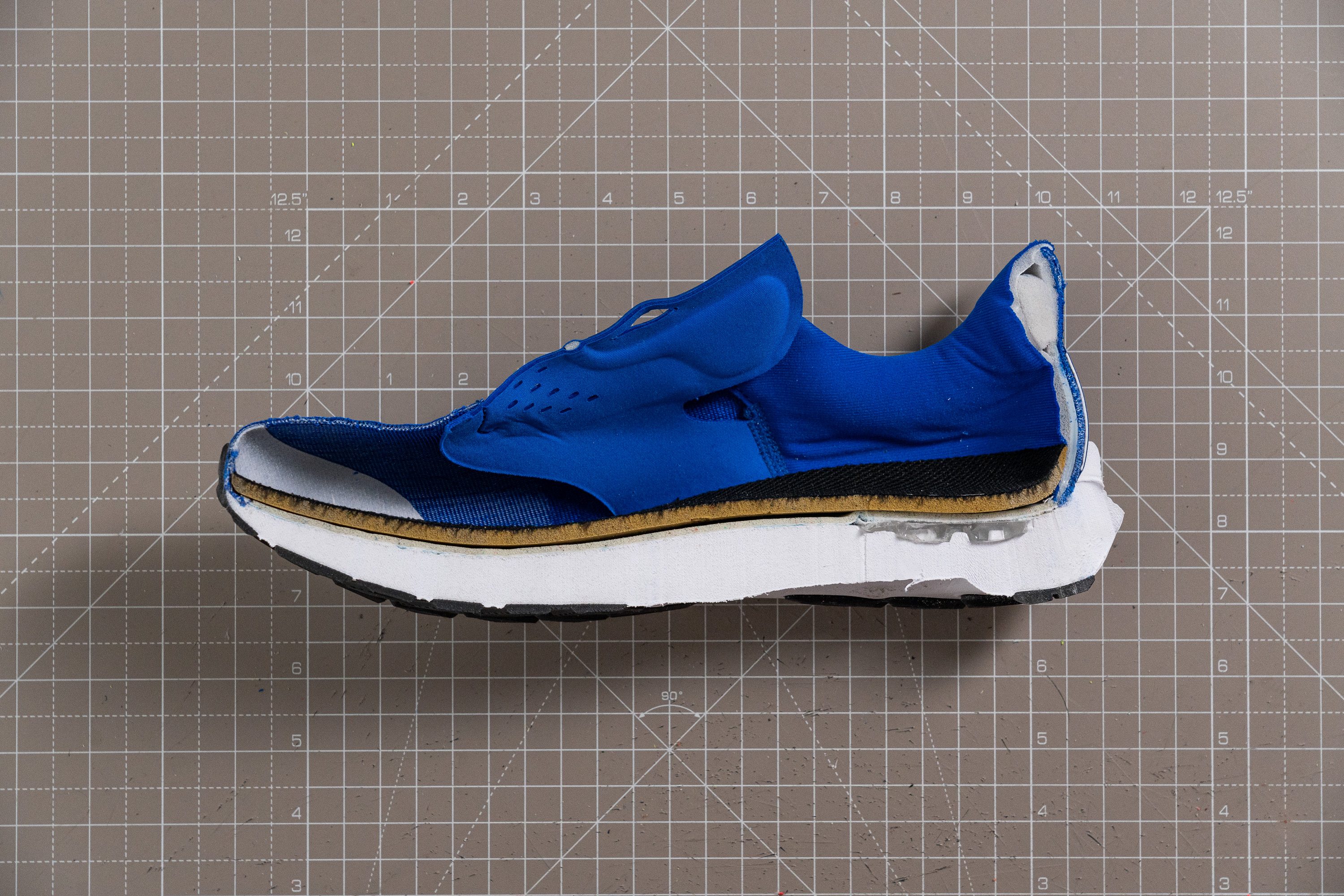
| GT 2000 12 | 10.0 mm |
| Average | 8.6 mm |
Midsole softness
Now, let's dive into the midsole, where we see another upgrade from the previous version. We've transitioned from FF Blast to the improved FF Blast+. This means you'll enjoy more energy return and cushioning for your money, dead simple.
In our experience, the new FF Blast+ midsole, which we measured at 25.1 HA on our durometer, results in a lighter and more responsive ride. Additionally, the PureGEL in the heel adds a significant amount of comfort to the heel area.
However, don't anticipate the plush ride found in other FF Blast+ shoes from ASICS, as they tweaked the formulation to be denser in order to boost stability. This is more of a balanced ride, which, in our opinion, aligns perfectly with a shoe designed to offer excellent stability.
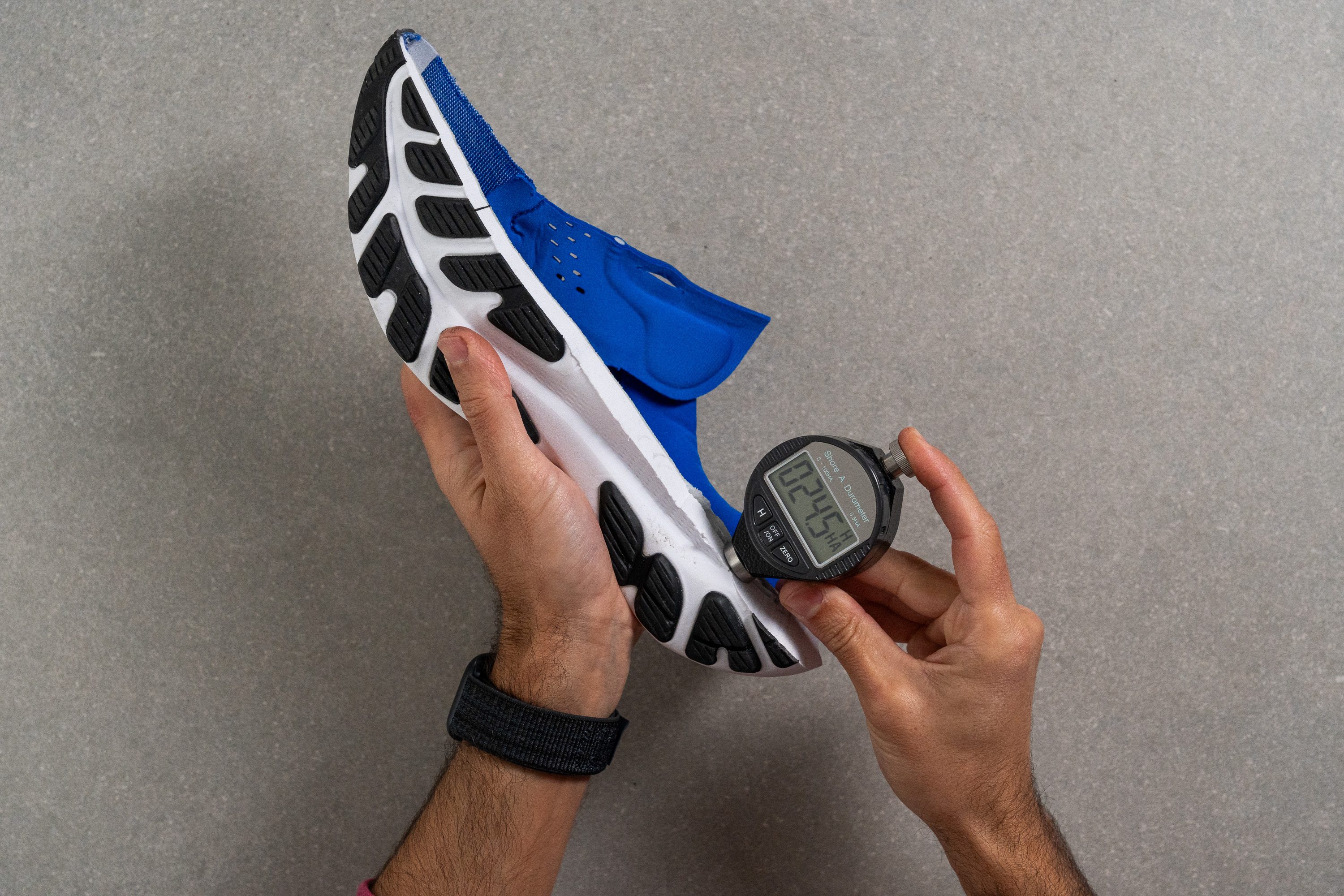
| GT 2000 12 | 25.1 HA |
| Average | 20.4 HA |
Size and fit
Size
ASICS GT 2000 12 fits true to size (120 votes).
Internal length
| GT 2000 12 | 273.0 mm |
| Average | 269.4 mm |
Width / Fit
The upper offers a comfortable, versatile fit that will suit most runners. ASICS also provides a wide size option in select markets for those who need it.
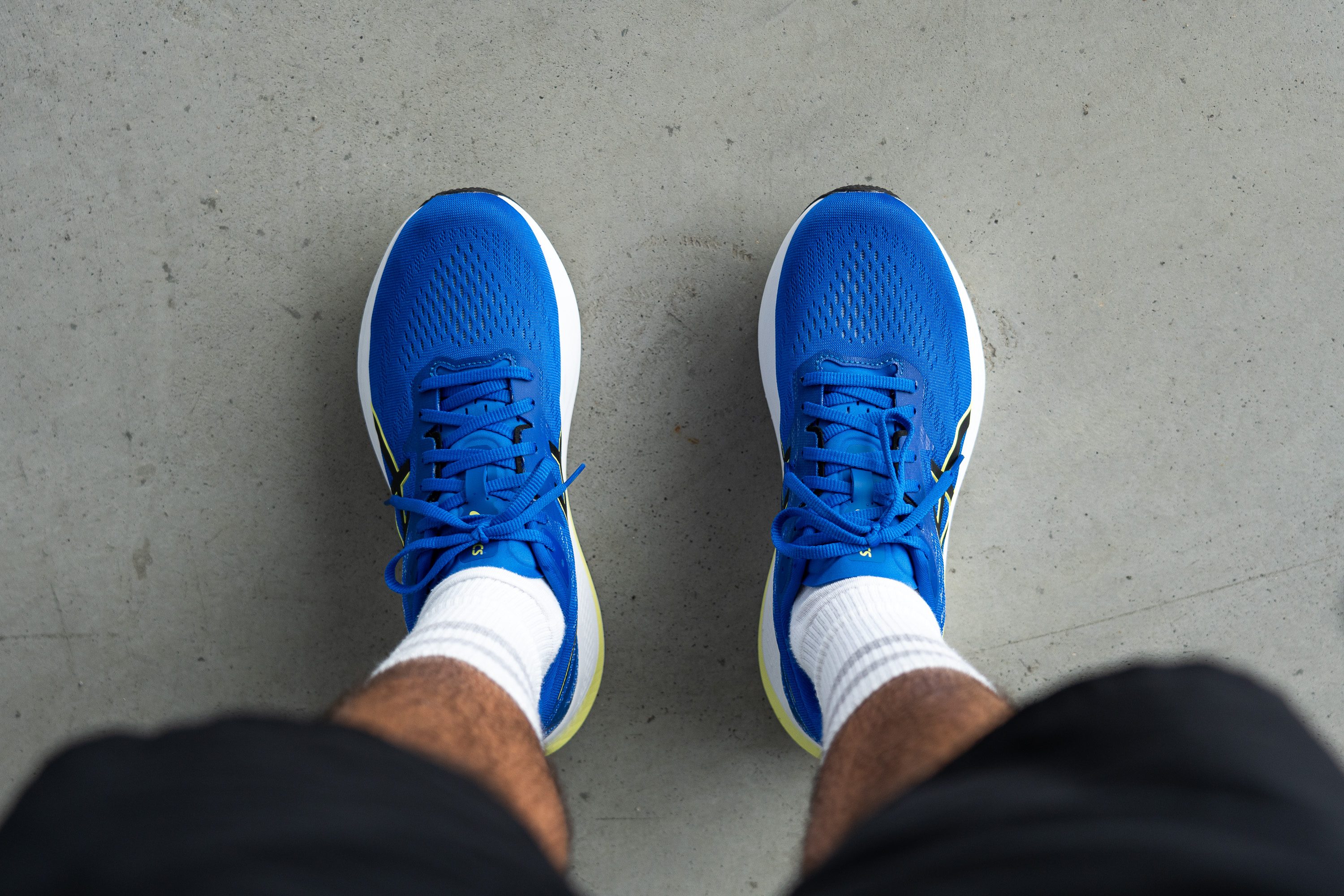
It measures 99.8 mm in its widest part, and paired with a stretchy mesh, it delivers a great fit. We think it offers more room than previous versions and is capable of accommodating swollen feet on long runs.
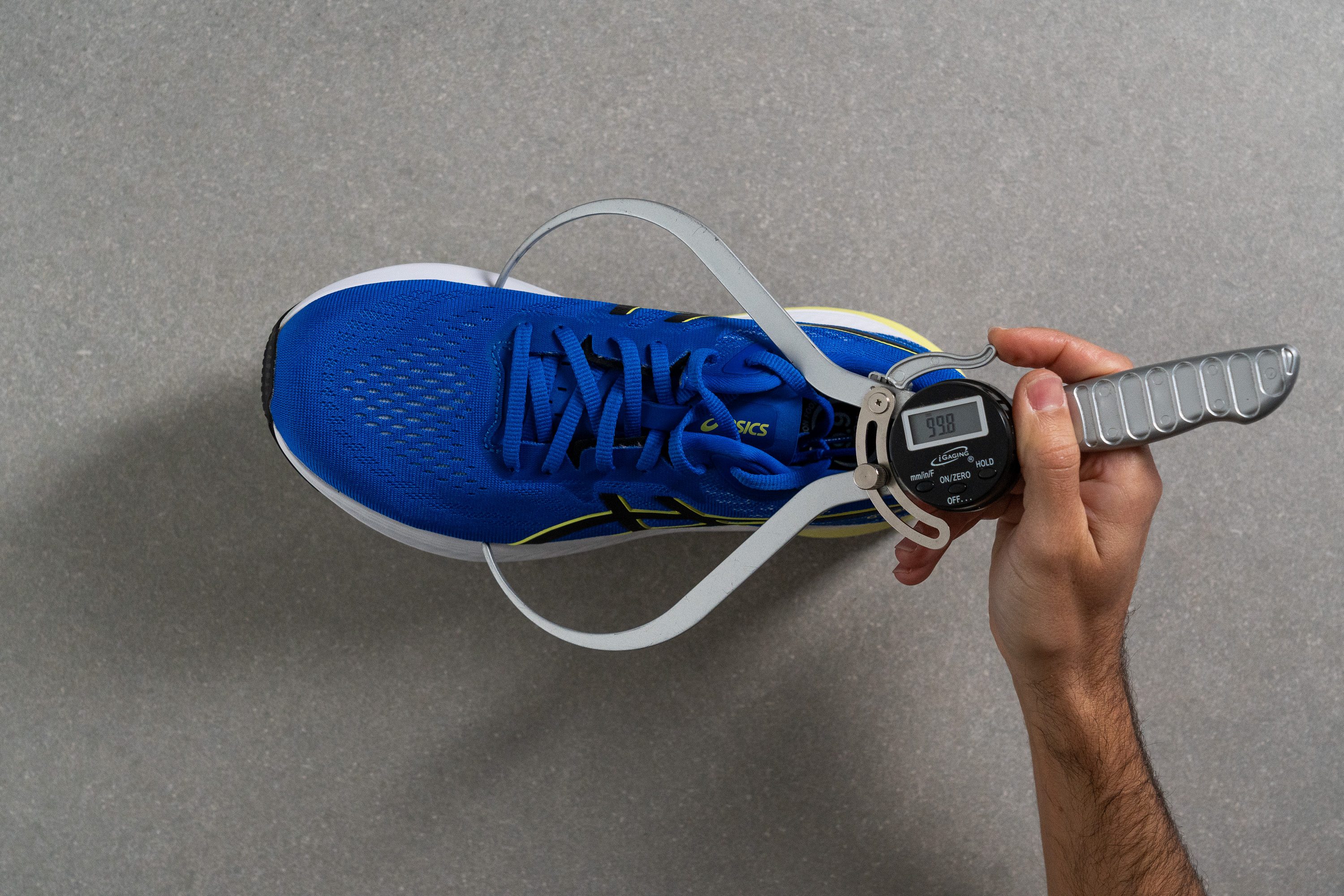
This test follows an older methodology, which is why you don't see recently tested shoes in the chart. Results from different methodologies can not be compared.
| GT 2000 12 | 99.8 mm |
| Average | 98.5 mm |
Toebox width
The big toe area measures at 78.9 mm, which falls into the average range too, maybe even slightly wider. We believe most runners will find this quite comfortable.
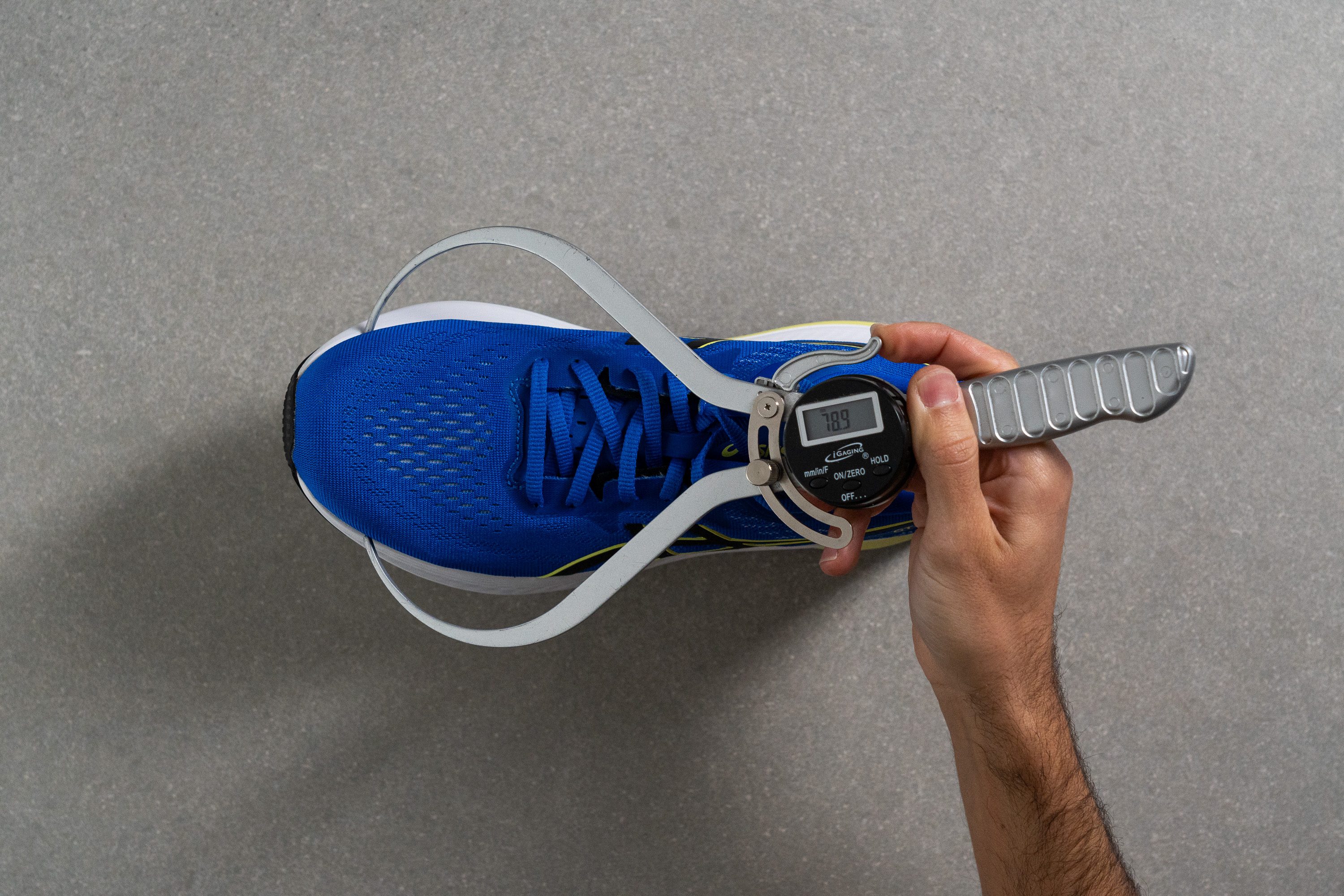
This test follows an older methodology, which is why you don't see recently tested shoes in the chart. Results from different methodologies can not be compared.
| GT 2000 12 | 78.9 mm |
| Average | 78.4 mm |
Traction / Grip
Traction test
We expected stronger traction from the GT 2000 12, especially as one of the top-tier stability models in the ASICS lineup. Instead, we found a 0.32 score—acceptable on dry pavement, but not exactly confidence-boosting when the ground turns slick.
| GT 2000 12 | 0.32 |
| Average | 0.49 |
Outsole design
The outsole of the ASICS GT 2000 12 combines strategically-placed black AHAR rubber segments with generous portions of exposed white foam. This layout aims to reduce weight while maintaining protection in high-impact areas like the heel and forefoot.
A series of deep flex grooves and segmentation lines run across the entire sole, enhancing longitudinal flexibility especially in the forefoot. The exposed foam dominates the midfoot and central sections, reducing overall coverage.
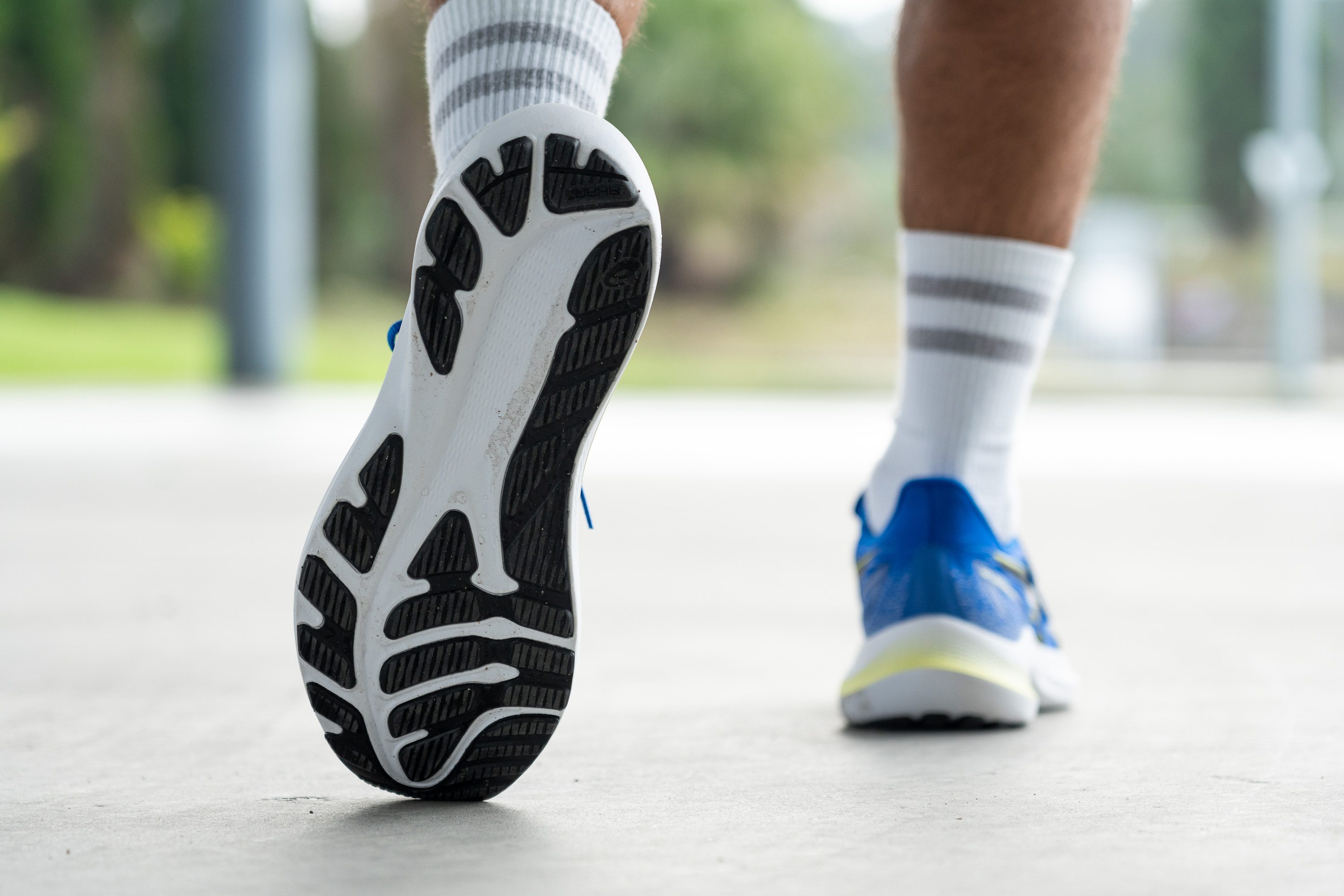
Flexibility / Stiffness
Here's another interesting part of our lab test. Despite its stability features, the GT 2000 12 is still a daily trainer, so it needs to be comfortable for activities like going to the gym or for a walk.
That's why we conducted our 30-degree bend test, where it scored 16.1N. This is around average, though it might be a bit stiffer compared to some neutral daily trainers. So while it may not be the ultimate choice for all-day wear, it will still perform great for most activities.
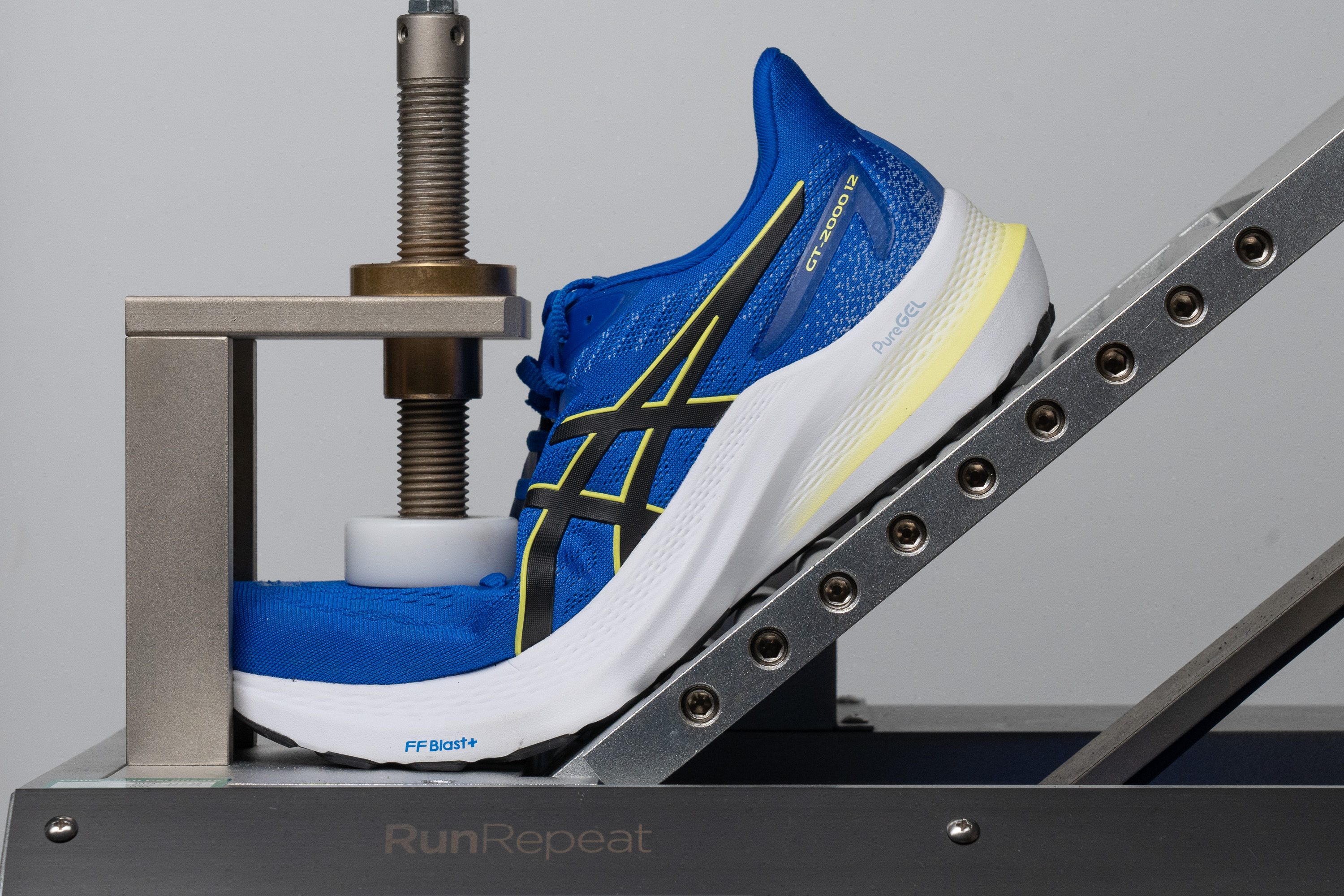
| GT 2000 12 | 16.1N |
| Average | 15.3N |
Stiffness in cold (%)
The FF Blast+ foam delivered another masterclass in cold temperatures, getting only 14.5% stiffer when we repeated our 90-degree bend test.
This is an amazing result that, combined with its decent breathability, makes this shoe a top choice for winter runs.
| GT 2000 12 | 15% |
| Average | 33% |
Weight
The weight was a pleasant surprise for us in the lab. The GT 2000 11 was already known for being reasonably lightweight in its stability category, but the GT 2000 12 goes a step further.
It sheds an additional 0.2 ounces, bringing it down to a total of 9.7 oz (275g). Impressively, it stays one more year below the 10-oz benchmark—an outstanding achievement!
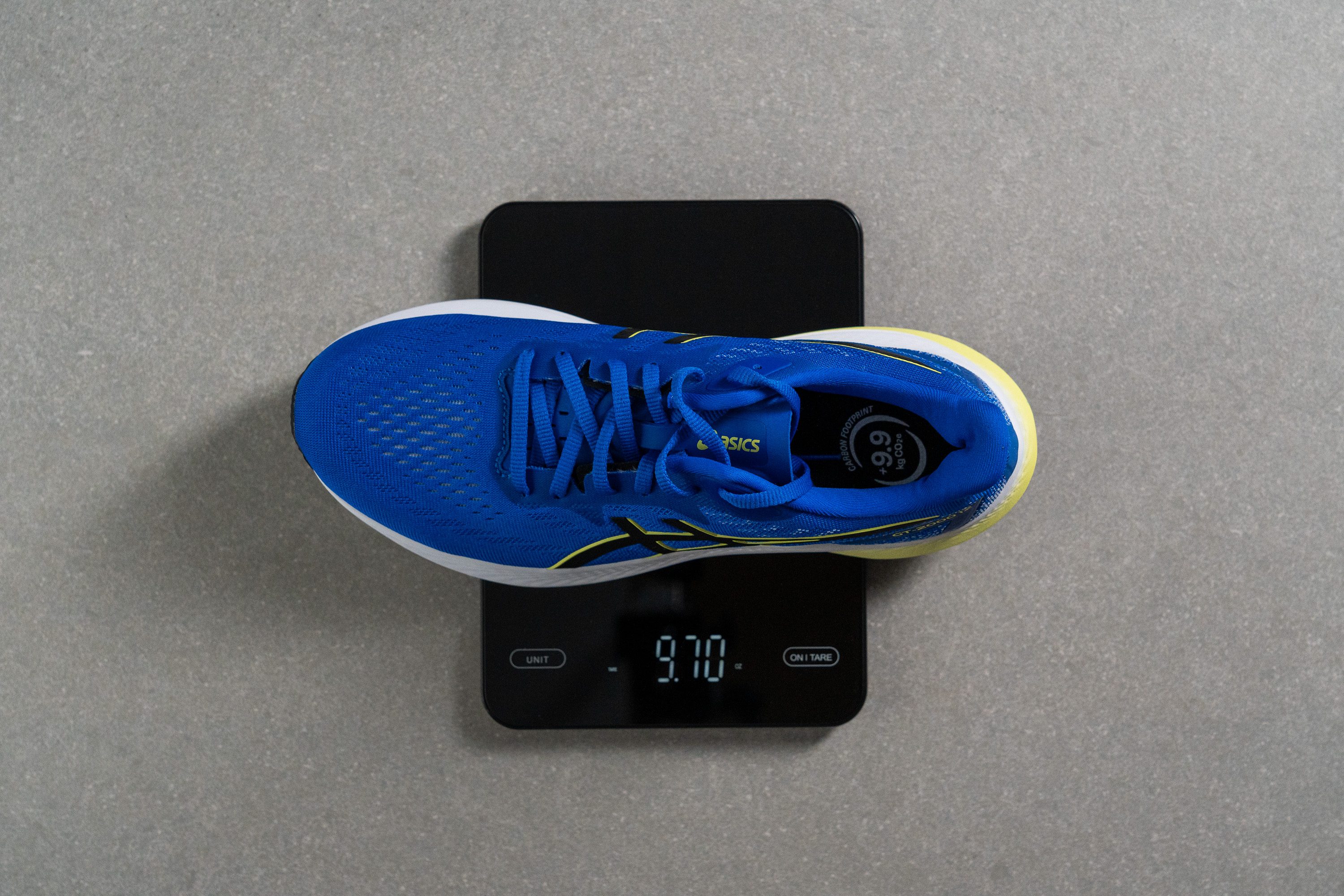
| GT 2000 12 | 9.7 oz (275g) |
| Average | 9.3 oz (264g) |
Breathability
At first glance, we noticed the GT 2000 12's upper seemed well ventilated. The toebox had many holes, leading us to expect optimal breathability.
However, our smoke test rated it 3 out of 5, proving looks can be deceiving. However, this score suggests the shoe will perform quite well in most conditions, except during extremely hot weather.
This highlights the importance of proper lab testing for shoes. Our eyes might mislead us about features like breathability. In fact, in some tests—like our light test—the shoe appeared to offer more airflow than it actually does.
To get a closer look at the ventilation holes, we used a microscope.
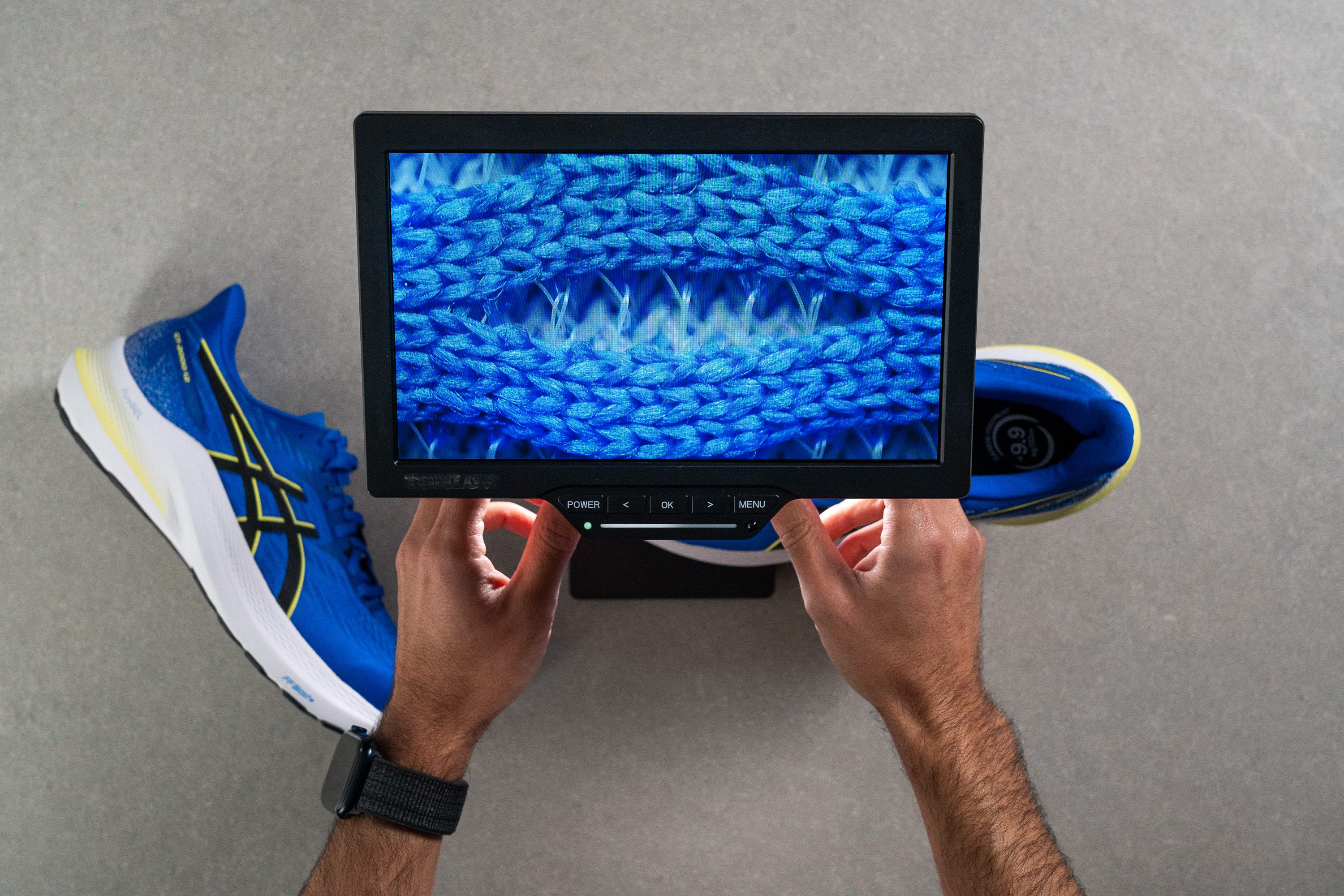
There we saw the mentioned holes, but a somewhat dense fabric underneath them restricts airflow.
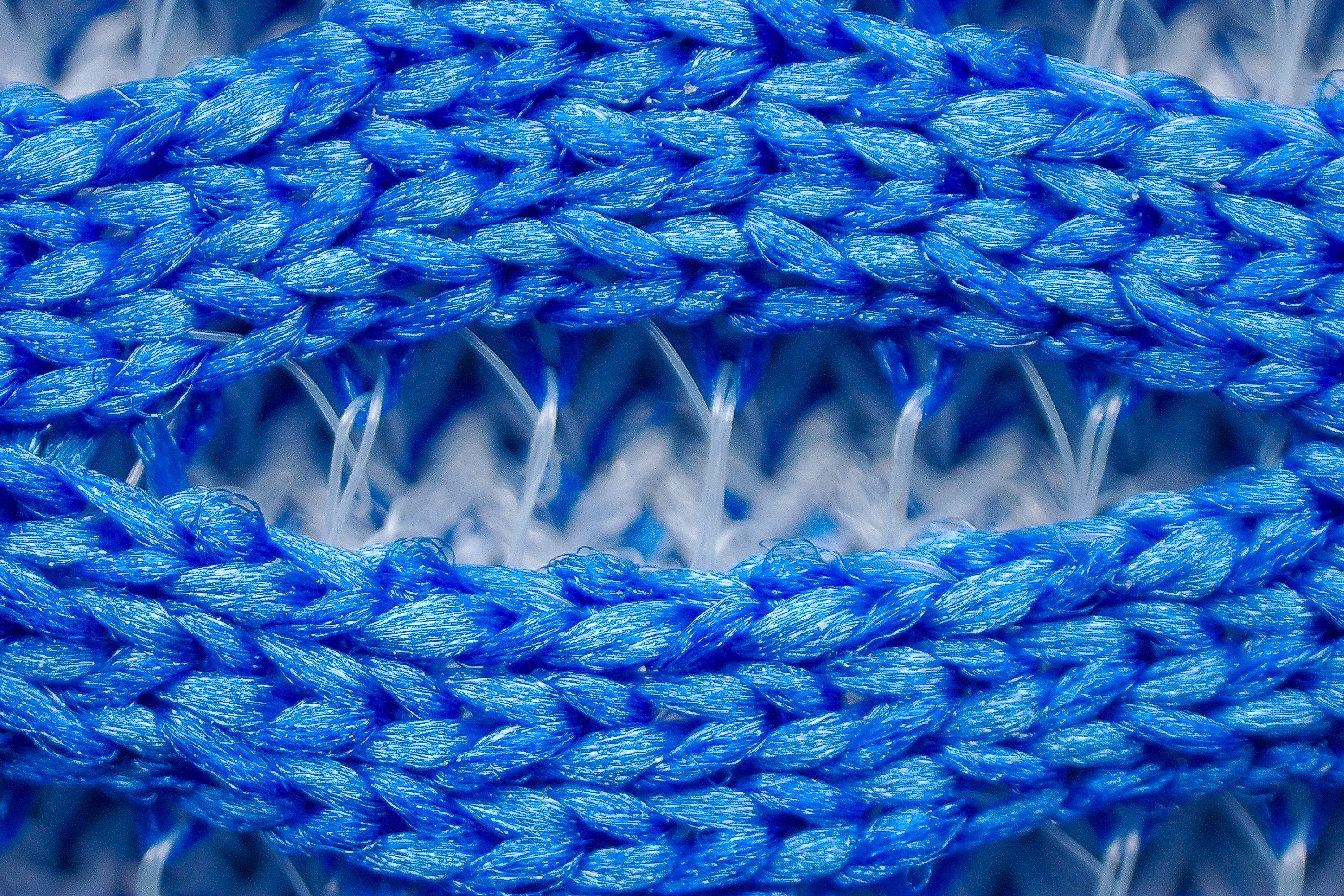
This fabric beneath the jacquard mesh upper boosts comfort and reduces friction. But it also limits airflow.
For the next version, we'd like to see the same fabric, but with tiny holes to enhance air circulation.
| GT 2000 12 | 3 |
| Average | 3.7 |
Stability
Lateral stability test
However, if there's one standout feature in this shoe, it's undoubtedly stability. As a stable daily trainer—arguably one of the most successful one in recent years—the expectations were sky-high in the lab.
We were thrilled to find that the shoe, designed for runners with mild stability needs or neutral runners seeking a reliable, easy-day shoe, excelled in this area. This success is largely thanks to the 3D Guidance System, a combination of a wider landing base, specific midsole geometry, and supportive upper.
But the story doesn't end here!
Torsional rigidity
A key feature in any stability shoe is a decent level of torsional rigidity. However, in our view, some brands take the easy route and just create super-rigid shoes. These are indeed stable, but often uncomfortable.
On the contrary, the GT 2000 12 scored a 4 out of 5 in our torsional rigidity test. This means it's rigid enough to provide stability, yet still comfortable enough for daily runs—just as it should be.
| GT 2000 12 | 4 |
| Average | 3.5 |
Heel counter stiffness
The heel counter echoes this positive narrative, also earning a 4 out of 5 score. It's rigid, yes, but not overly so—it feels just right, striking an ideal balance between support and comfort. And on top of that, it's really well padded.
| GT 2000 12 | 4 |
| Average | 2.9 |
Midsole width - forefoot
Then, there's another essential feature of any stability shoe that the GT 2000 12 easily ticks off—midsole width.
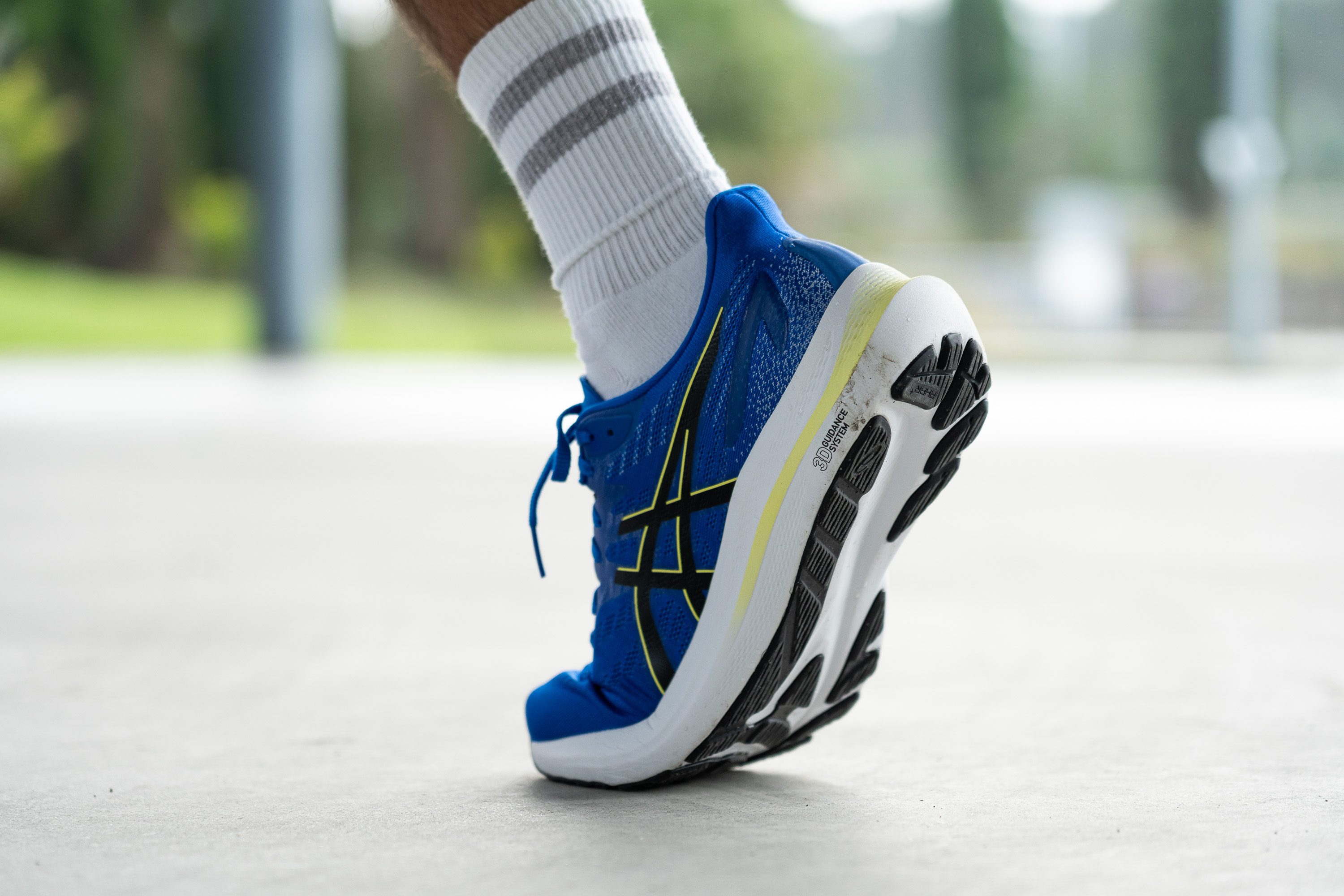
Naturally, the wider the base, the more stable the ride. We measured the widest part of the forefoot at 119.3 mm, and we even think it could be a bit narrower to reduce some weight.
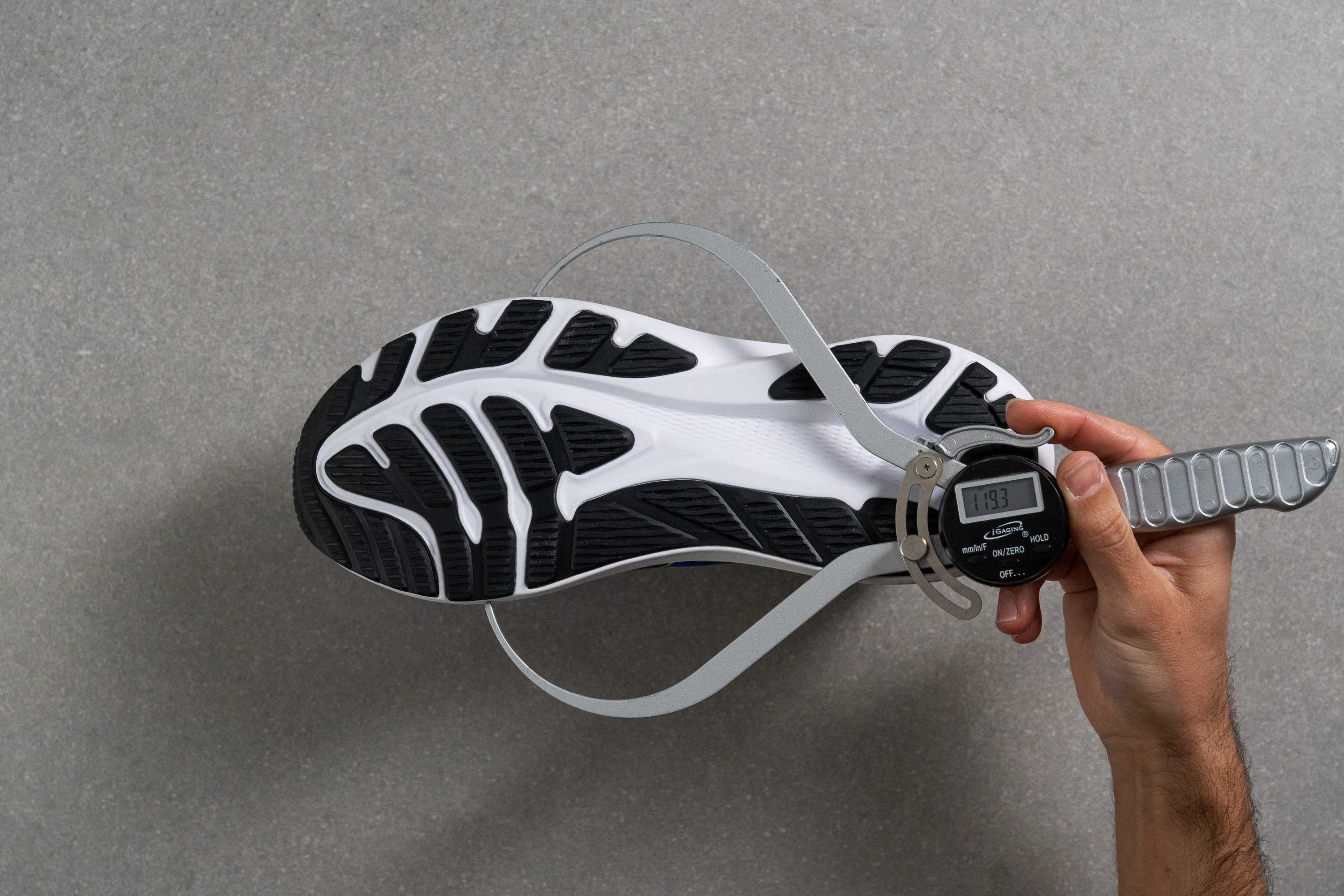
| GT 2000 12 | 119.3 mm |
| Average | 114.4 mm |
Midsole width - heel
The heel follows the same design approach as the forefoot, being significantly wider than your average daily trainer. We measured it at 96.3 mm, ensuring that even if you're an extreme heel striker, the GT 2000 12 has got you covered.
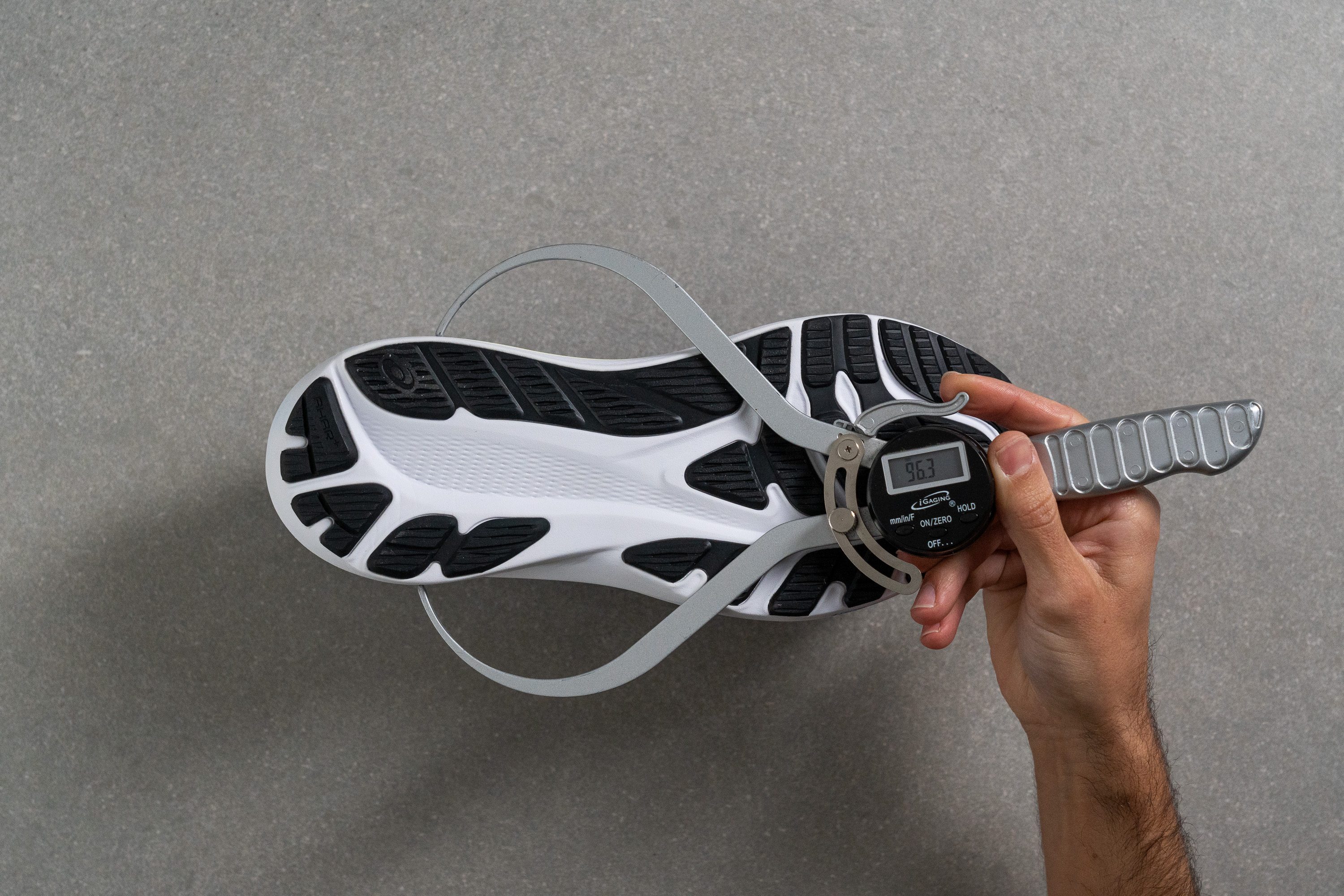
| GT 2000 12 | 96.3 mm |
| Average | 90.6 mm |
Durability
Toebox durability
If you're a runner who prioritizes durability over breathability, the GT 2000 is sure to impress you.
Thanks to the robust fabric beneath the jacquard mesh, this shoe excelled in our rigorous Dremel test. It scored an impressive 3 out of 5 in our toebox durability assessment!
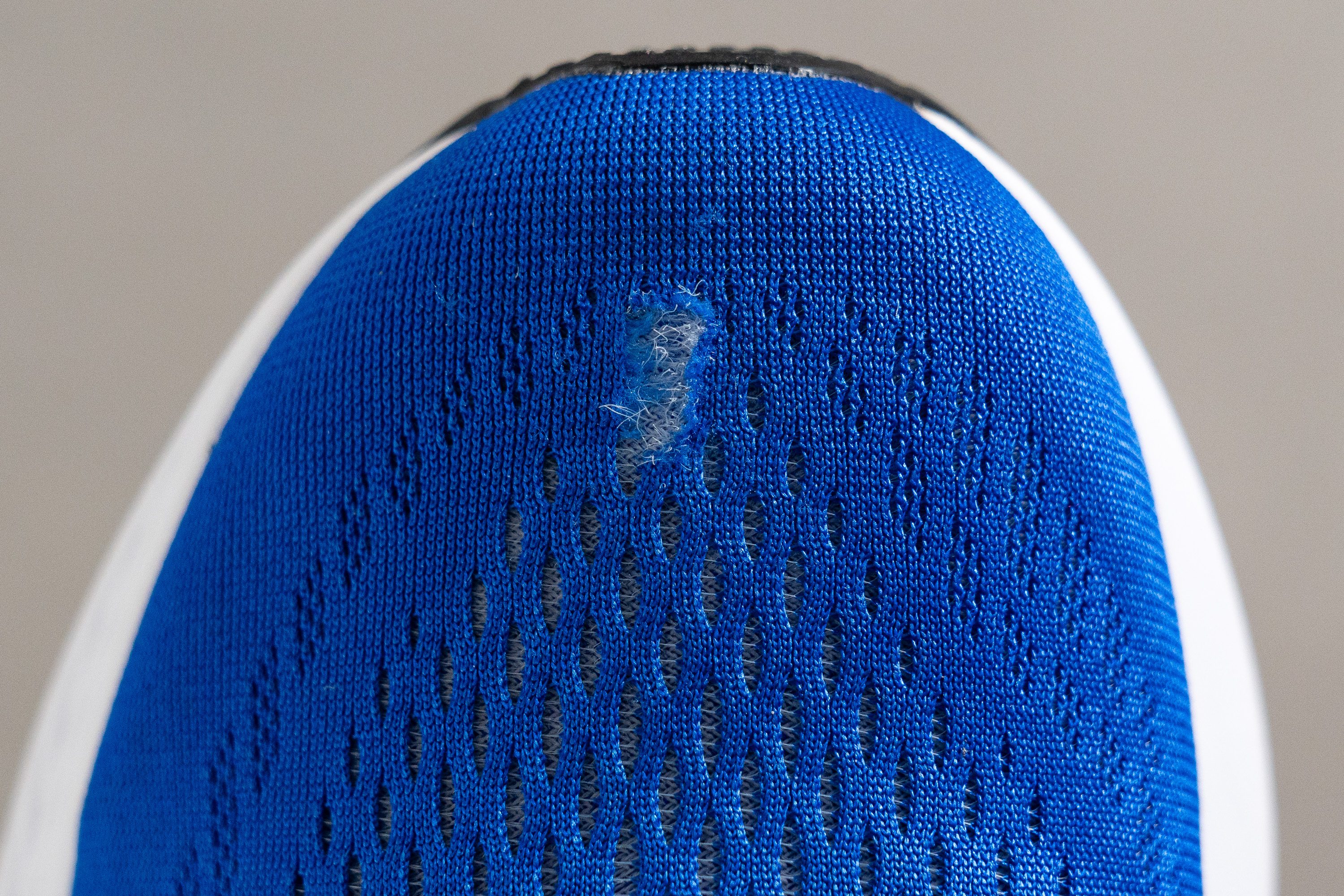
| GT 2000 12 | 3 |
| Average | 2.6 |
Heel padding durability
And it just keeps getting better! In the heel area, which is generously padded, we achieved an even better result—a fantastic 4 out of 5.
This is a remarkable score for a shoe designed to endure as a daily trainer.
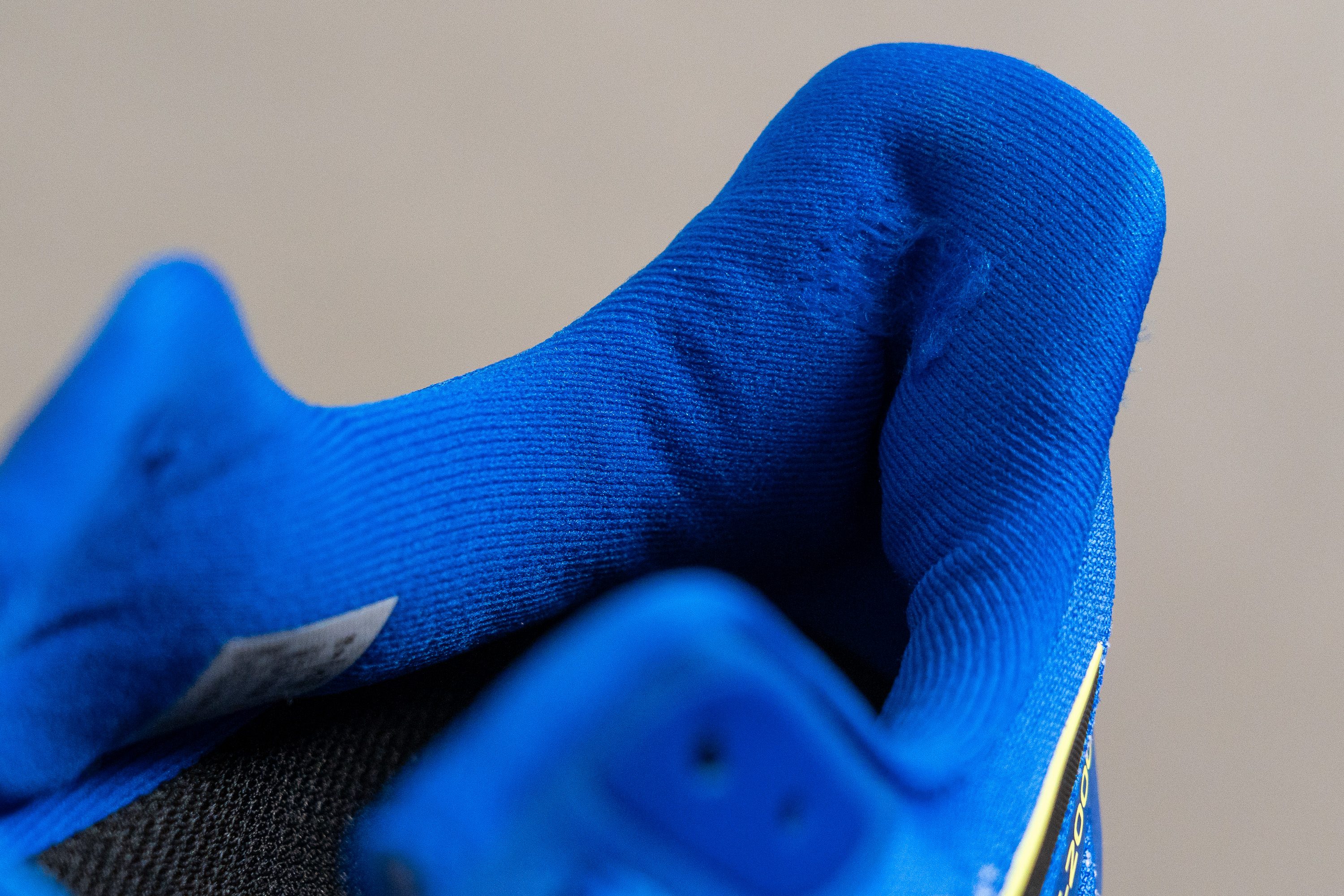
| GT 2000 12 | 4 |
| Average | 3.4 |
Outsole durability
ASICS went all out with the GT 2000, incorporating some of its top-notch technologies. That's why the outsole doesn't just have the standard AHAR rubber but features a combination of AHARPLUS and AHAR LO-HRD. This duo should deliver outstanding grip and durability.
In our Dremel test, we noticed the rubber was performing exceptionally well. However, it was only after measuring it that we discovered a mere 0.4-mm indentation. This is incredibly impressive and assures a long-lasting outsole.
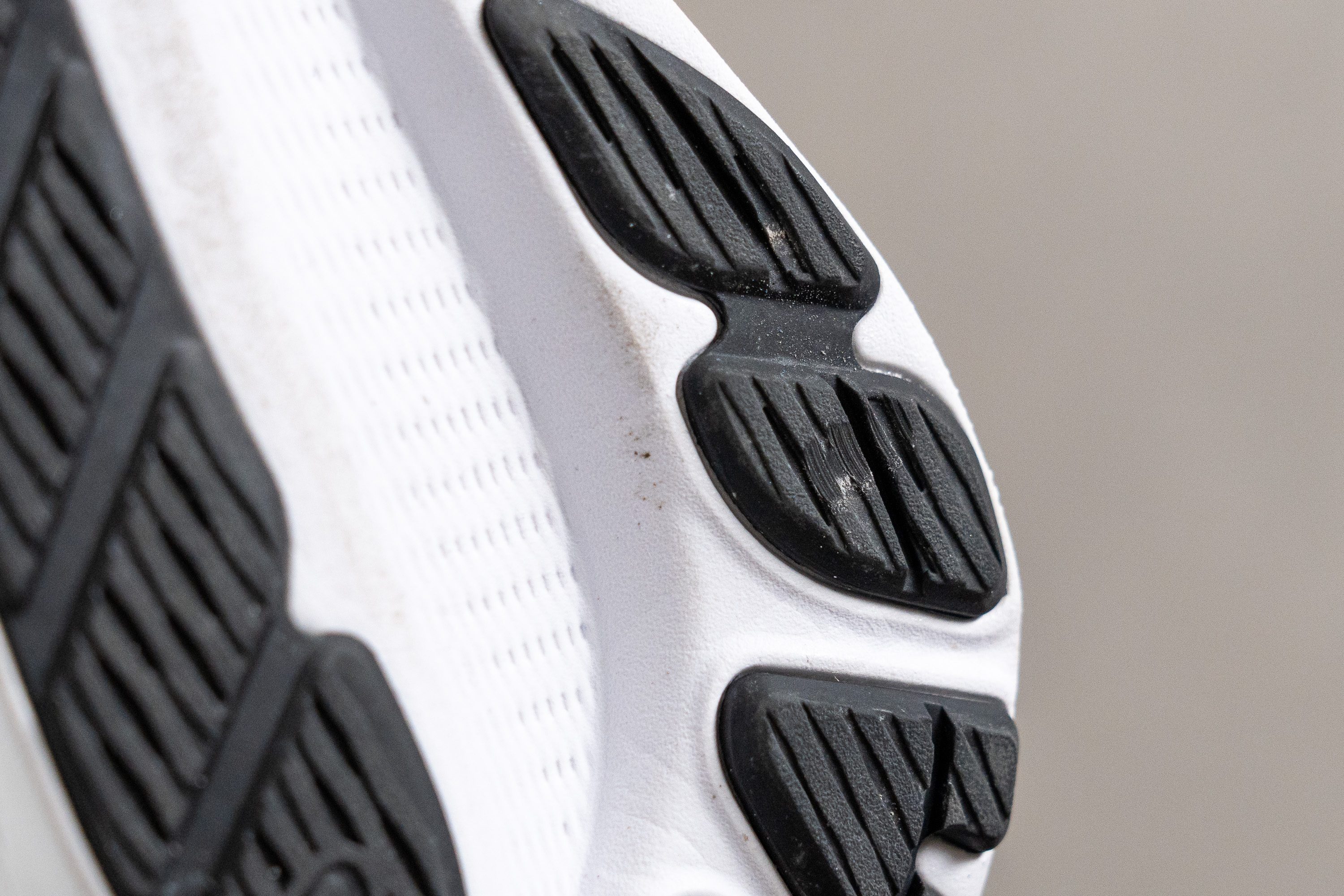
| GT 2000 12 | 0.4 mm |
| Average | 1.1 mm |
Outsole thickness
But hey, if you're still wondering about its durability, here's the ultimate proof—a 4.2-mm thickness in the outsole.
With this generous amount of rubber, even those who tend to wear out outsoles quickly won't have any issues with this one.
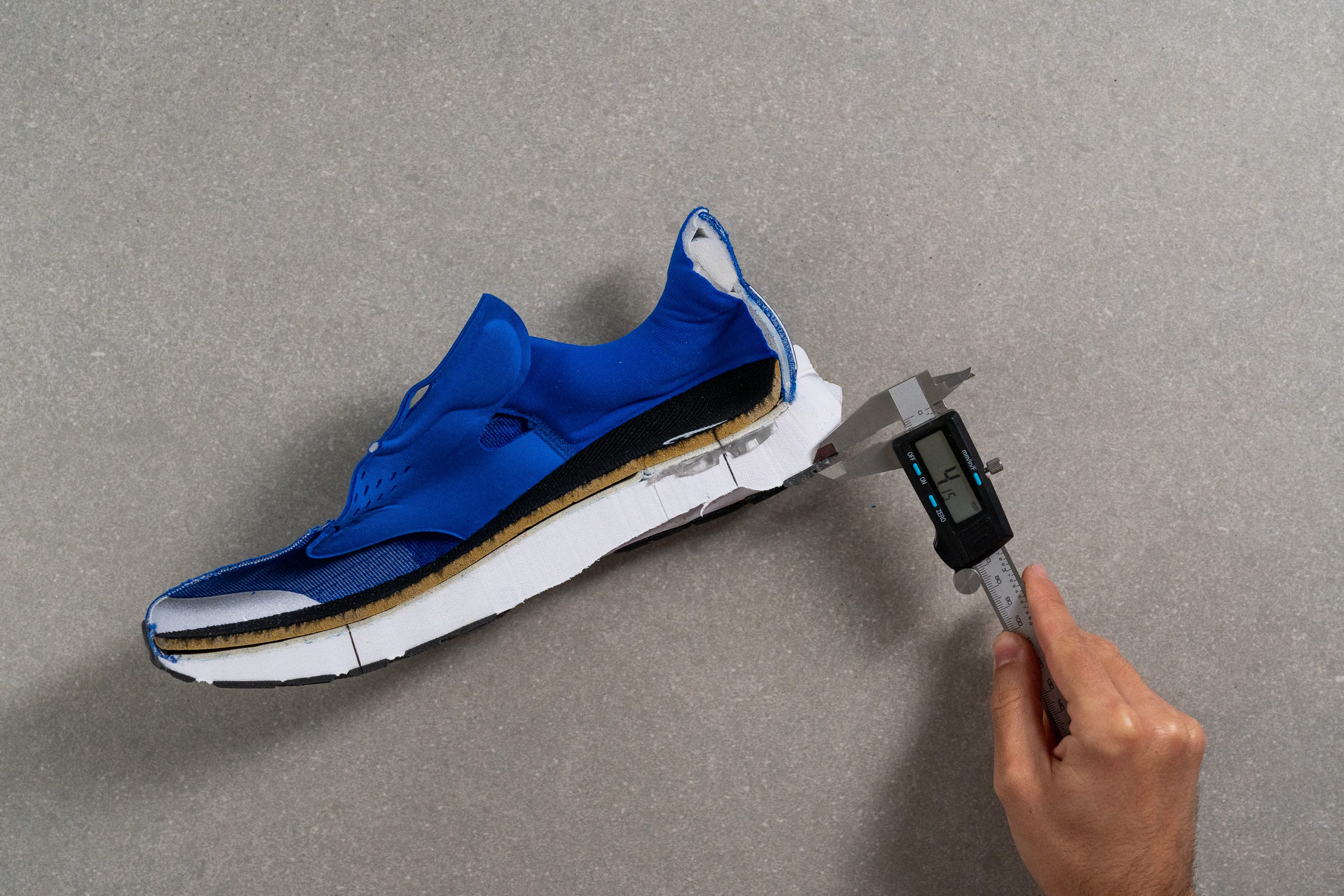
| GT 2000 12 | 4.2 mm |
| Average | 3.2 mm |
Misc
Insole thickness
The Ortholite insole is softer than ever. And at 5.2 mm, it adds an extra boost of cushioning underfoot.
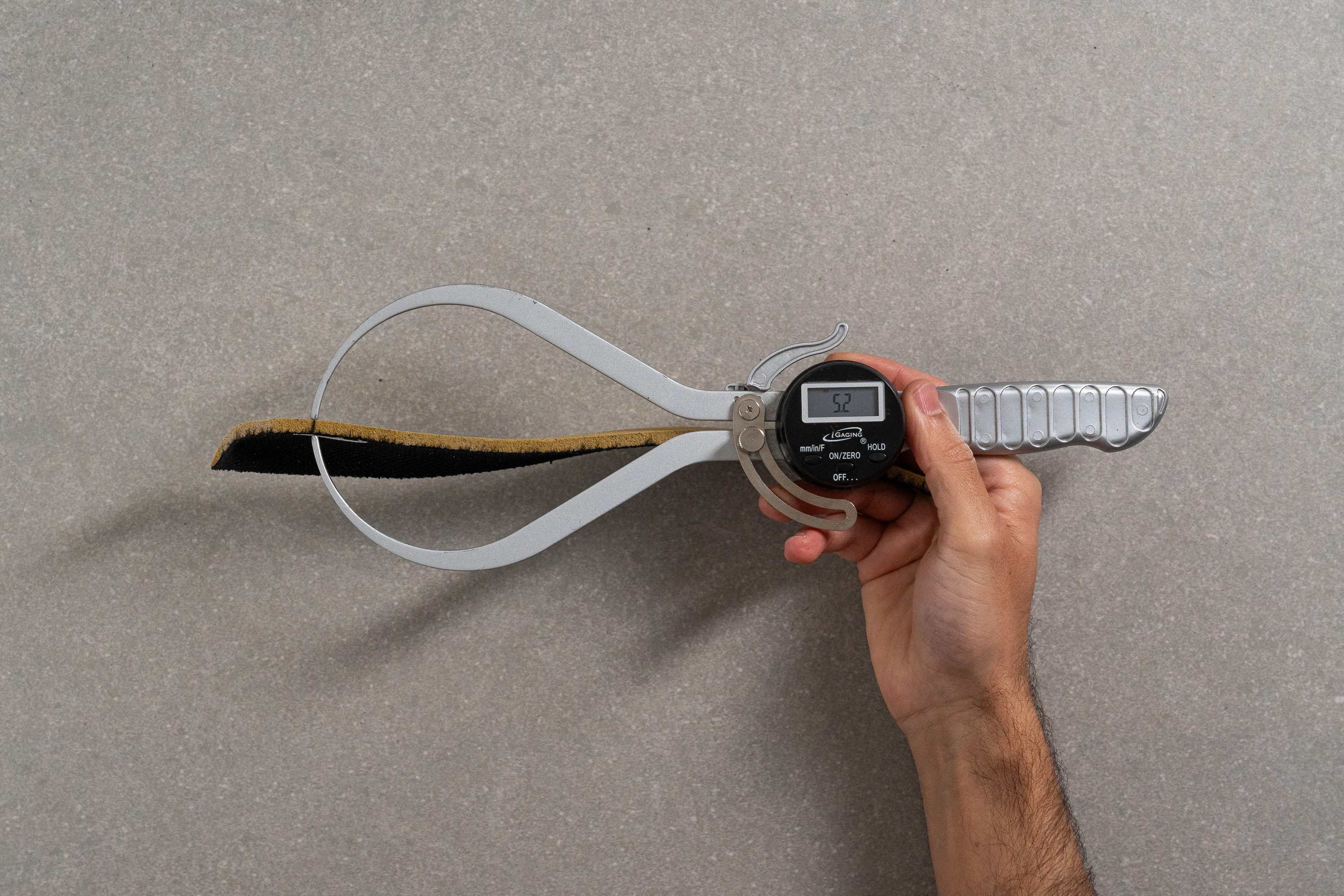
| GT 2000 12 | 5.2 mm |
| Average | 4.5 mm |
Removable insole
We discovered that the GT 2000 comes with an Ortholite X-30 insole, one of the best on the market. However, if you prefer a different insole, you can easily swap it out since it's not glued in place.
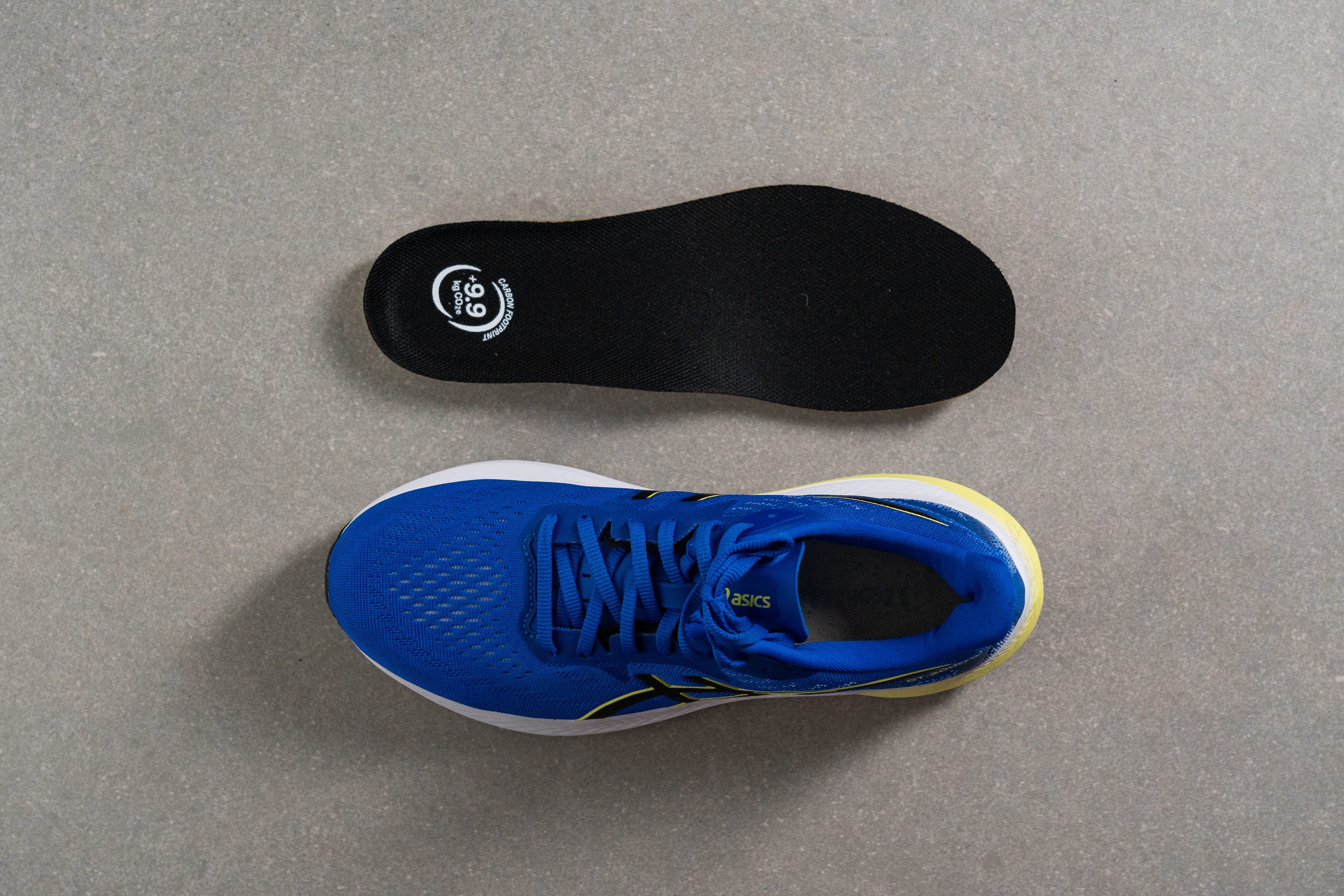
| GT 2000 12 | Yes |
Midsole softness in cold (%)
To understand how the FF Blast+ foam—crafted from EVA mixed with OBC to enhance its properties—performs in winter, we placed it in the freezer for 20 minutes and re-tested it.
The outcome was impressive, as it became only 11.6% firmer, an excellent result indeed. Adding OBC to the mix clearly paid off.
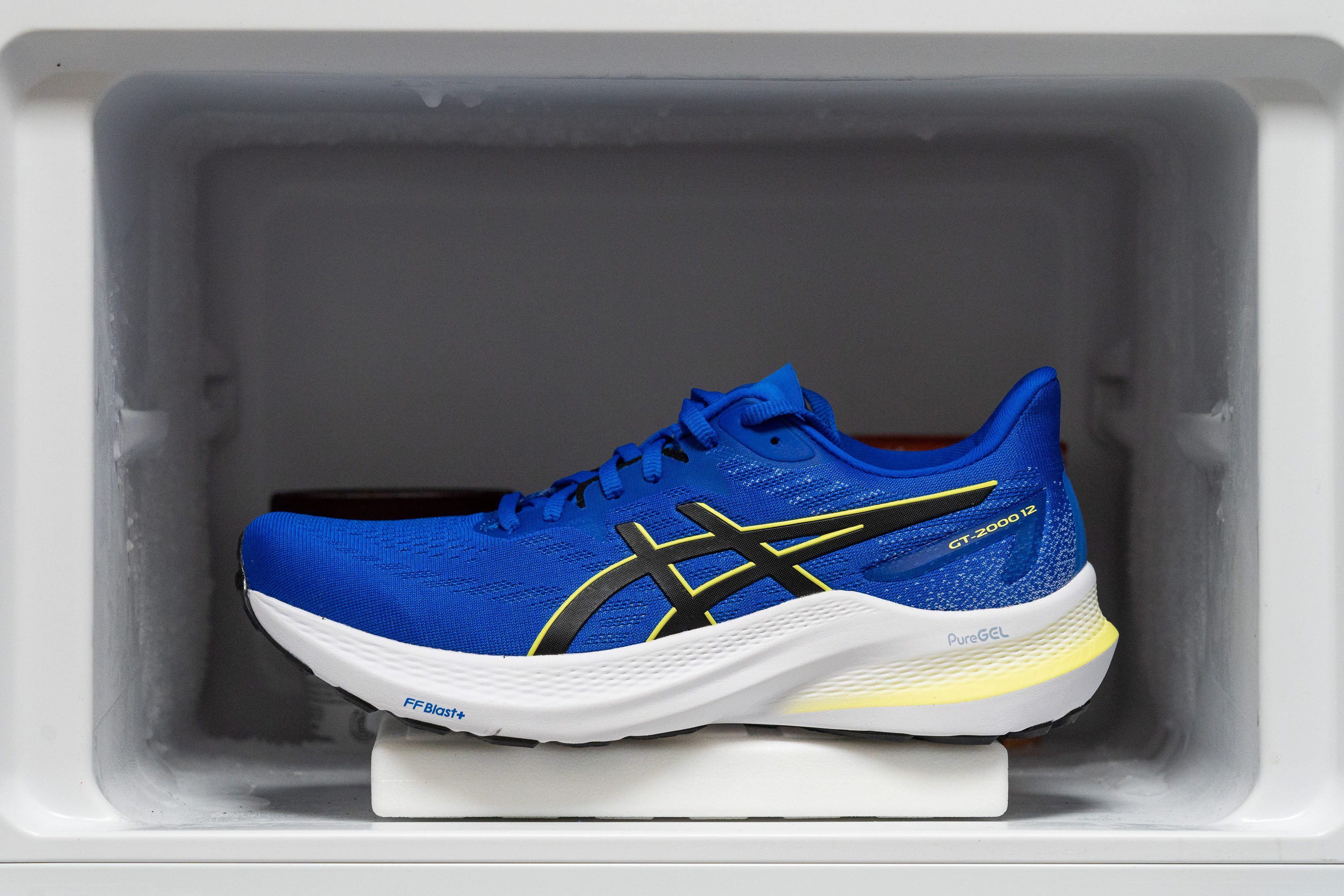
| GT 2000 12 | 12% |
| Average | 24% |
Reflective elements
We're not accustomed to finding reflective elements in daily trainers, but ASICS has delivered once again with the GT 2000 series. This is fantastic news for night runners who value visibility and safety!
| GT 2000 12 | Yes |
Tongue padding
In the previous GT 2000 model, we encountered a 12.5-mm tongue, which seemed excessive for a daily trainer and contributed significantly to the shoe's weight.
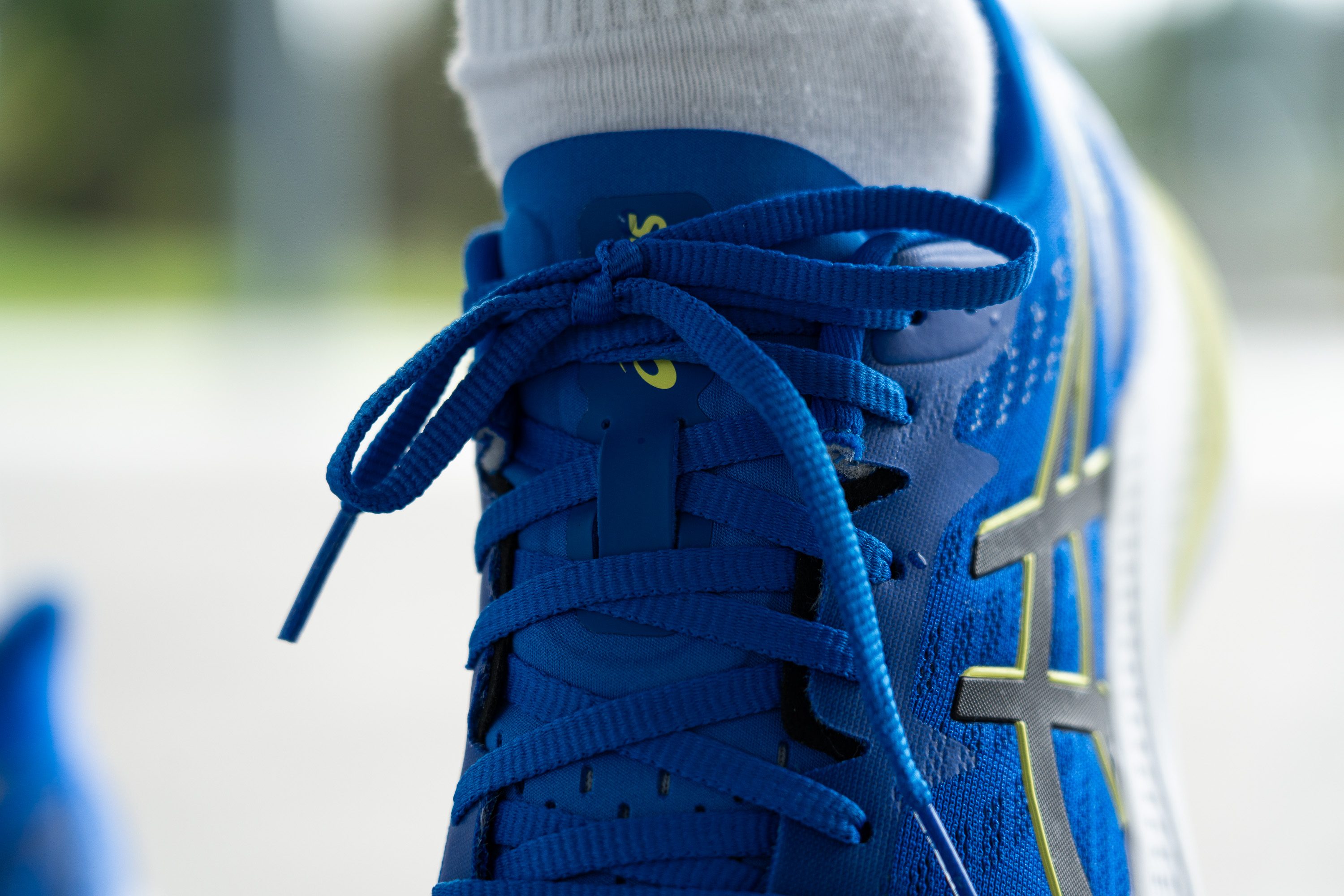
Fortunately, ASICS' designers got back to the drawing board for version 12 and delivered a thinner, 4.7-mm tongue. This is more than sufficient and greatly reduces the weight—a clever improvement!
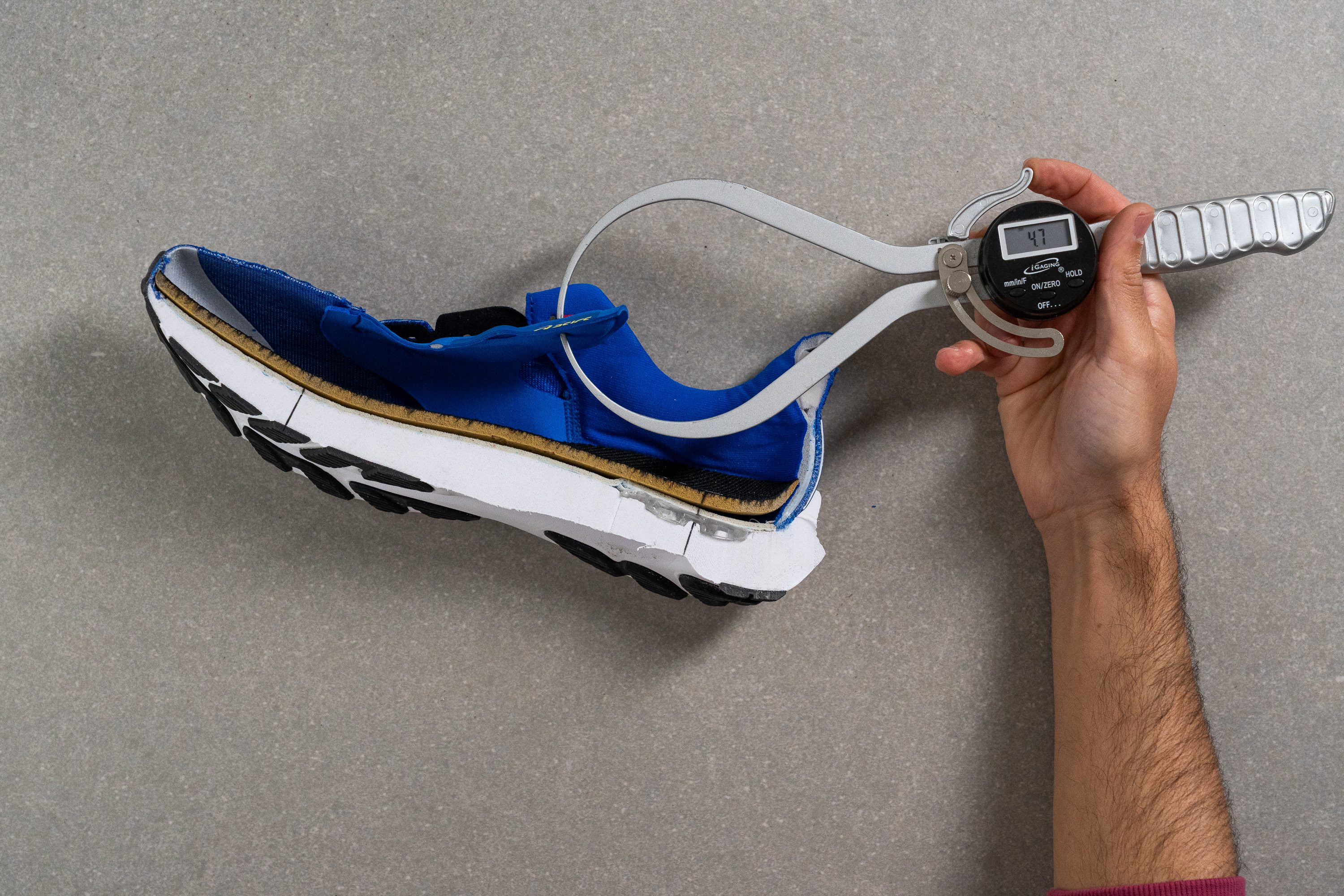
| GT 2000 12 | 4.7 mm |
| Average | 5.7 mm |
Tongue: gusset type
The tongue is semi-gusseted, which is definitely a major bonus in a $140 shoe and a departure from the non-gusseted tongue of the v11.
It really contributes to achieving an even better lockdown, a feature that has always been a staple of the GT 2000 series.
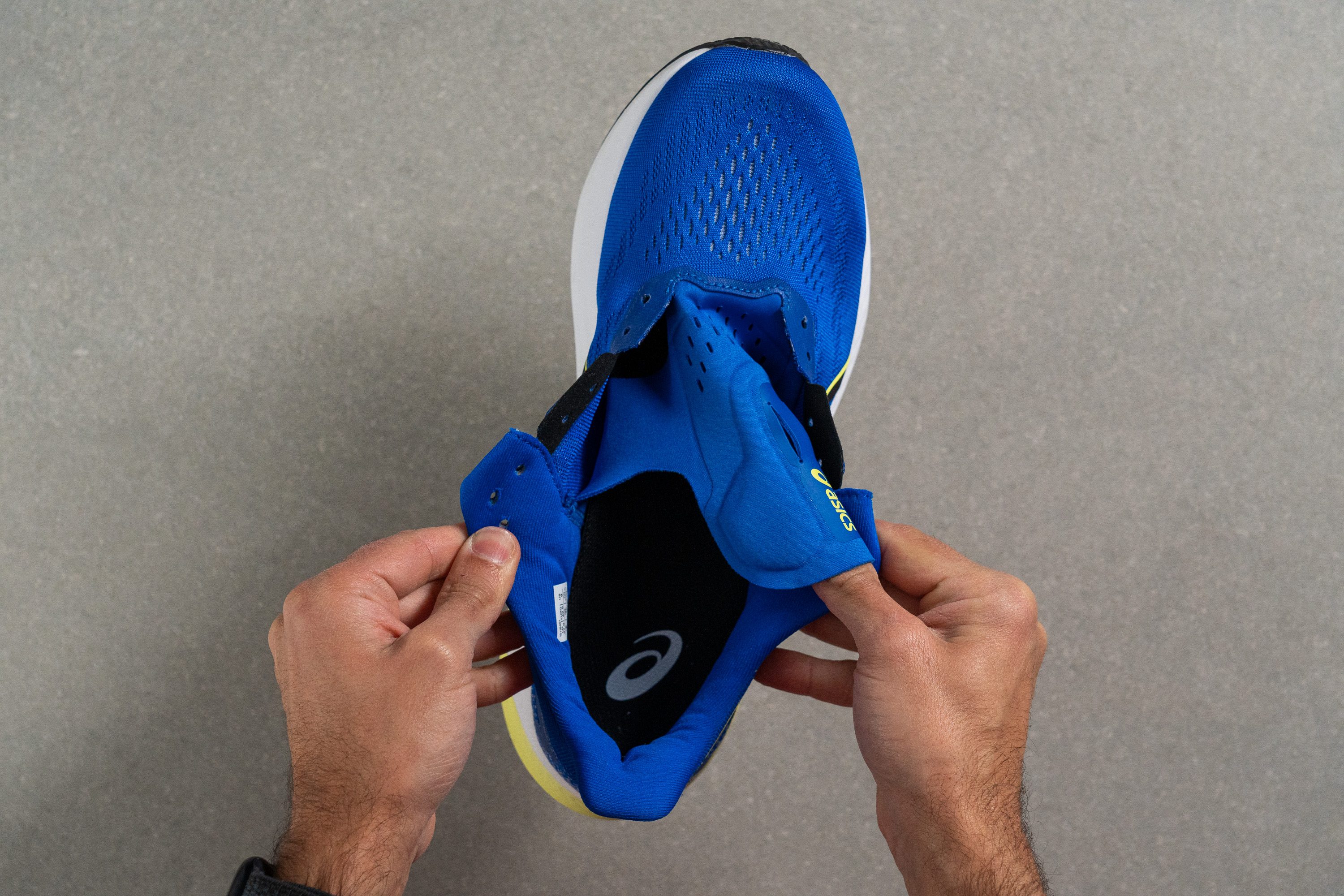
| GT 2000 12 | Both sides (semi) |
Heel tab
The GT 2000 12 doesn't have a heel tab at the back. However, the heel collar extends in a Hoka-like style, and you can certainly pull it on from there if needed.
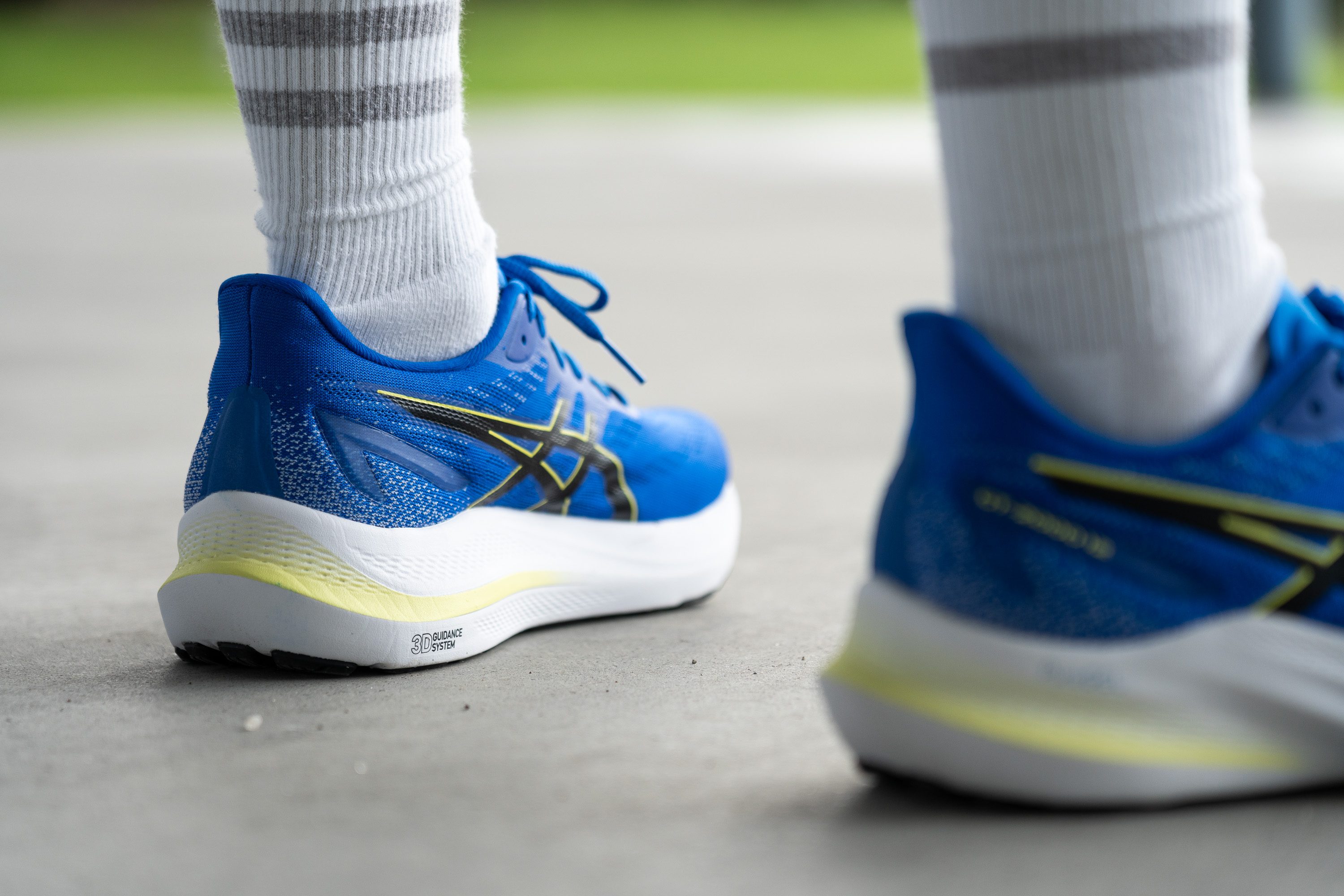
| GT 2000 12 | None |

